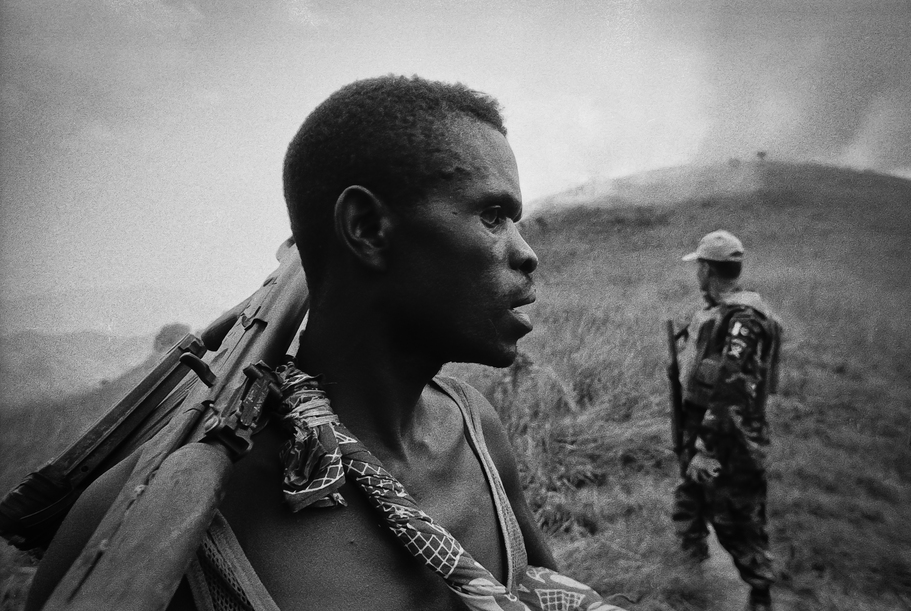

A Rwandan militiaman aligned with the Forces for the Democratic Liberation of Rwanda (FDLR) is taken captive by UN forces in the Walungu territory of South Kivu, DRC. The UN guards emptied the captive's Kalashnikov (rifle) of bullets and made him carry his gun and a sack of his few meager belongings as they marched him out of the remote hills where peasants had reduced the forests to swidden and the peasants worked the hillsides with giant hoes while fires sometimes burned around them. The FDLR are roundly accused of the worst crimes in the Congo, while the true perpetrators of mass atrocities on an unimaginable unquantifiable and unprecedented scale are sent into the Congo by the criminal elite regimes in power in Rwanda and Uganda. The dictatorships of Paul Kagame (Rwanda) and Yoweri Museveni (Uganda) are supported (in every way) by the United States, EU countries, and Israel, and are responsible for war crimes, crimes against humanity and genocide in Uganda (1980-present), Rwanda (1990-present), Congo (1995-present) and Burundi (1990-present).
Make Comment/View Comments
Additional Credits
Video
Photographer Statement
License
To license this work for editorial, creative, or other uses, click on the OZMO logo above.
This will take you to the Ozmo website retro toys where you can review the cost and license for the photographs in this exhibit.
You will need to create an account with both Amazon payments and with the Ozmo website as described on the Ozmo website.
Tags
Content loading...
Resources
Affiliated NGO
Contact Photographer
Stats
Effacer le Tableau
keith harmon snow | Central Africa
Photographer: keith harmon snow
Exhibit Title: Effacer le Tableau
Location: Central Africa
Countless forces have perpetrated war crimes, crimes against humanity and genocide in Africa's great lakes region. The almost permanent insecurity and violence in the region is driven by corruption, dictatorship, and the global demand for natural resources.
Armed conflict and related violence have plagued the border states of the eastern DR Congo; these include tortures, abductions, disappearing, coupled with starvation, poverty, sexual crimes, forced labor.
Effacer le Tableau roughly translates to "erasing the board" and it is one of many brutal military campaigns that brought unspeakable atrocities upon the local populations; atrocities still occur, throughout the great lakes region, and the climate of insecuirty and impunity persists today. Meanwhile, proper documentation, collection of testimonies and preservation of evidence is lacking.
This ongoing long term project documents war and related desperation and survival. It roughly began with my first journey into Zaire by bicycle in 1991, and it has followed the lives of some of the people seen herein, and it will continue to do so. It also seeks to explore truth, responsibility, accountability and possible reconciliation.
Countless forces have perpetrated war crimes, crimes against humanity and genocide in Africa's great lakes region. The almost permanent insecurity and violence in the region is driven by corruption, dictatorship, and the global demand for natural resources.
Armed conflict and related violence have plagued the border states of the eastern DR Congo; these include tortures, abductions, disappearing, coupled with starvation, poverty, sexual crimes, forced labor.
Effacer le Tableau roughly translates to "erasing the board" and it is one of many brutal military campaigns that brought unspeakable atrocities upon the local populations; atrocities still occur, throughout the great lakes region, and the climate of insecuirty and impunity persists today. Meanwhile, proper documentation, collection of testimonies and preservation of evidence is lacking.
This ongoing long term project documents war and related desperation and survival. It roughly began with my first journey into Zaire by bicycle in 1991, and it has followed the lives of some of the people seen herein, and it will continue to do so. It also seeks to explore truth, responsibility, accountability and possible reconciliation.
Content loading...
Make Comment/View Comments

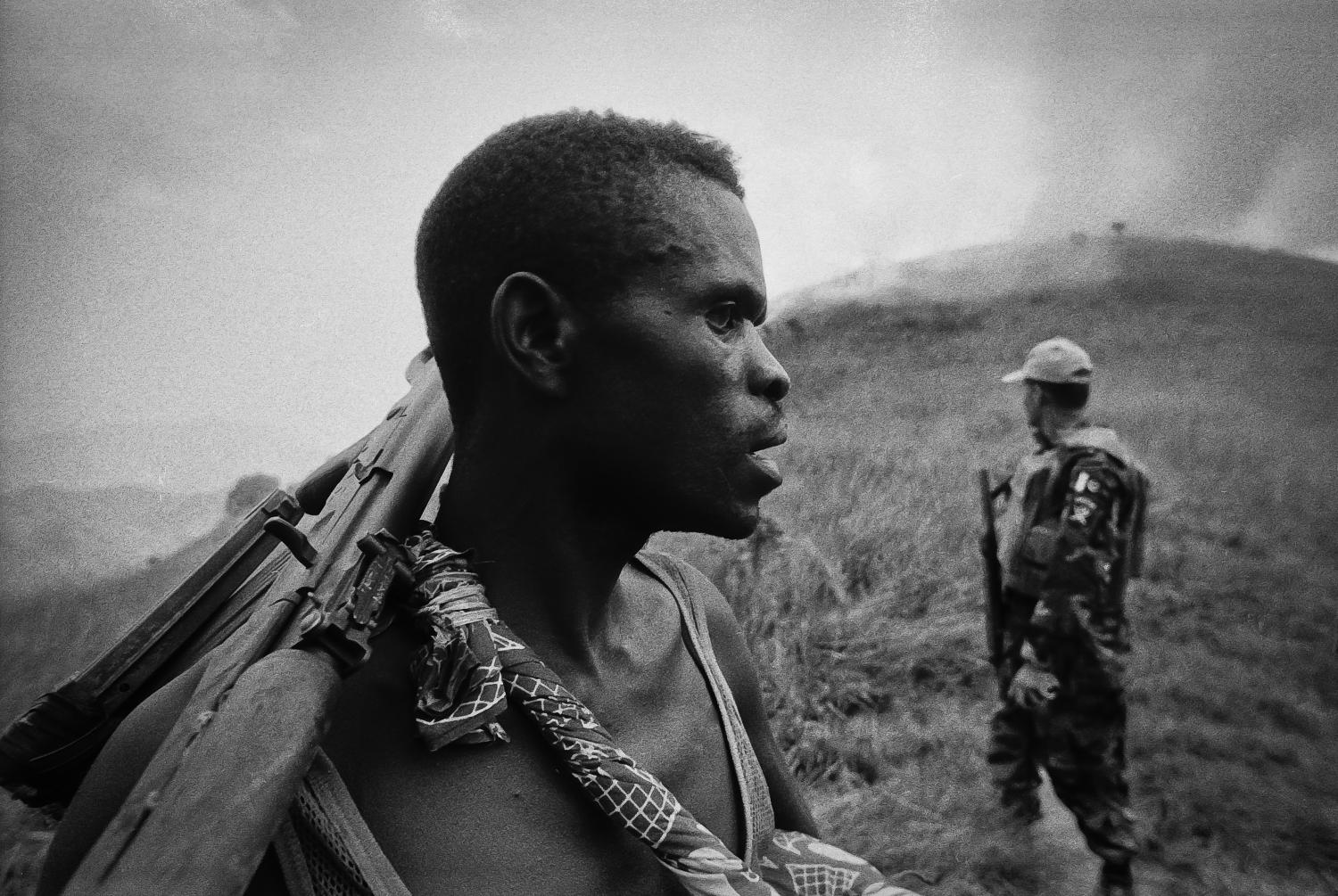
A Rwandan militiaman aligned with the Forces for the Democratic Liberation of Rwanda (FDLR) is taken captive by UN forces in the Walungu territory of South Kivu, DRC. The UN guards emptied the captive's Kalashnikov (rifle) of bullets and made him carry his gun and a sack of his few meager belongings as they marched him out of the remote hills where peasants had reduced the forests to swidden and the peasants worked the hillsides with giant hoes while fires sometimes burned around them. The FDLR are roundly accused of the worst crimes in the Congo, while the true perpetrators of mass atrocities on an unimaginable unquantifiable and unprecedented scale are sent into the Congo by the criminal elite regimes in power in Rwanda and Uganda. The dictatorships of Paul Kagame (Rwanda) and Yoweri Museveni (Uganda) are supported (in every way) by the United States, EU countries, and Israel, and are responsible for war crimes, crimes against humanity and genocide in Uganda (1980-present), Rwanda (1990-present), Congo (1995-present) and Burundi (1990-present).
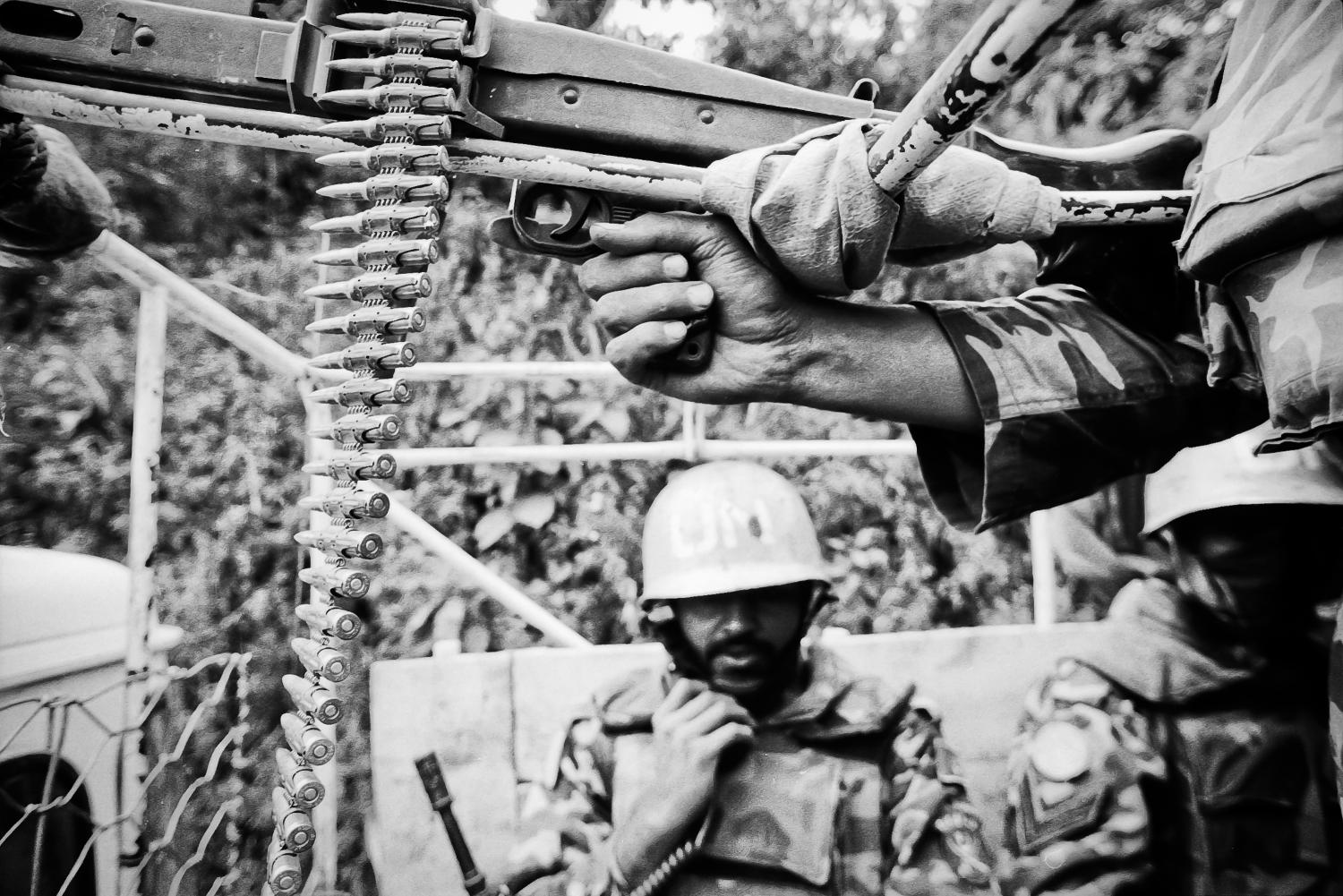
The forces of the United Nations Observers Mission in Congo (MONUC and MONUSCO) -- established in the Congo from 1999 and present in the Congo still -- have included soldiers from India, Brazil, Uruguay, Bangladesh, Pakistan and other developing countries, and they make more money working as paid soldiers abroad than they could make in their own countries.
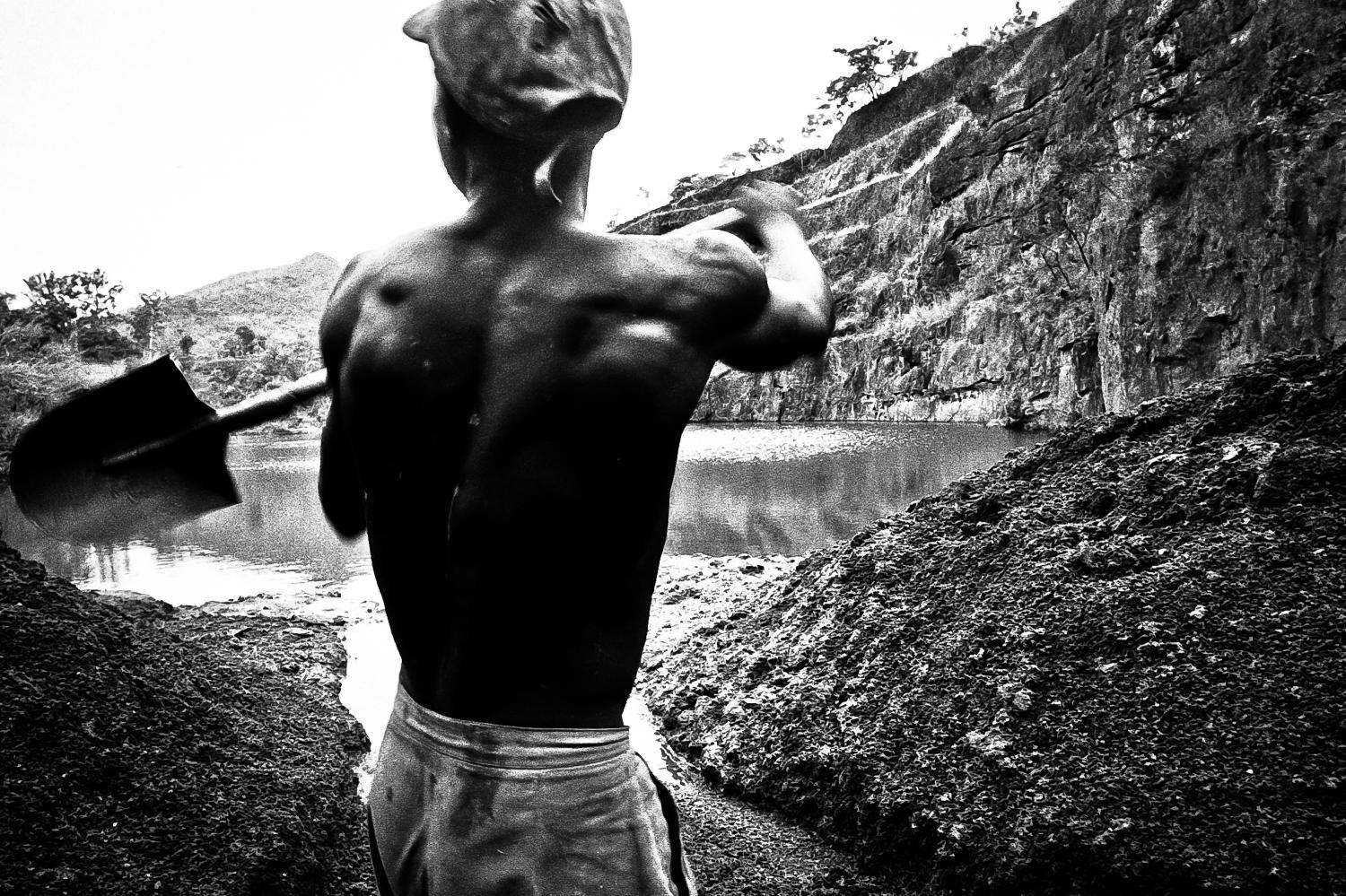
A young artisanal miner toils to extract a few ounces of gold out of a former Belgian colonial gold mine at Zani, in the blood drenched Ituri region of Orientale province, DRC. Artisanal mining in the great lakes conflict zones generally comes under the control of some military force or other, where the networks of soldiers and businessmen involved have highly organized networks involving taxation, racketeering, forced slave labor, other coercion, and direct violence served on the locals. The raw minerals make their way to foreign countries, and most of the violence occurs with impunity. Artisanal miners, who are generally Congolese victims of horrible inequality and injustice, are routinely blamed for their own suffering, while the corporate mining companies (e.g. Banro Gold, Moto Gold, Anglo-Ashanti, BHP, DeBeers, etc.) are rendered invisible.
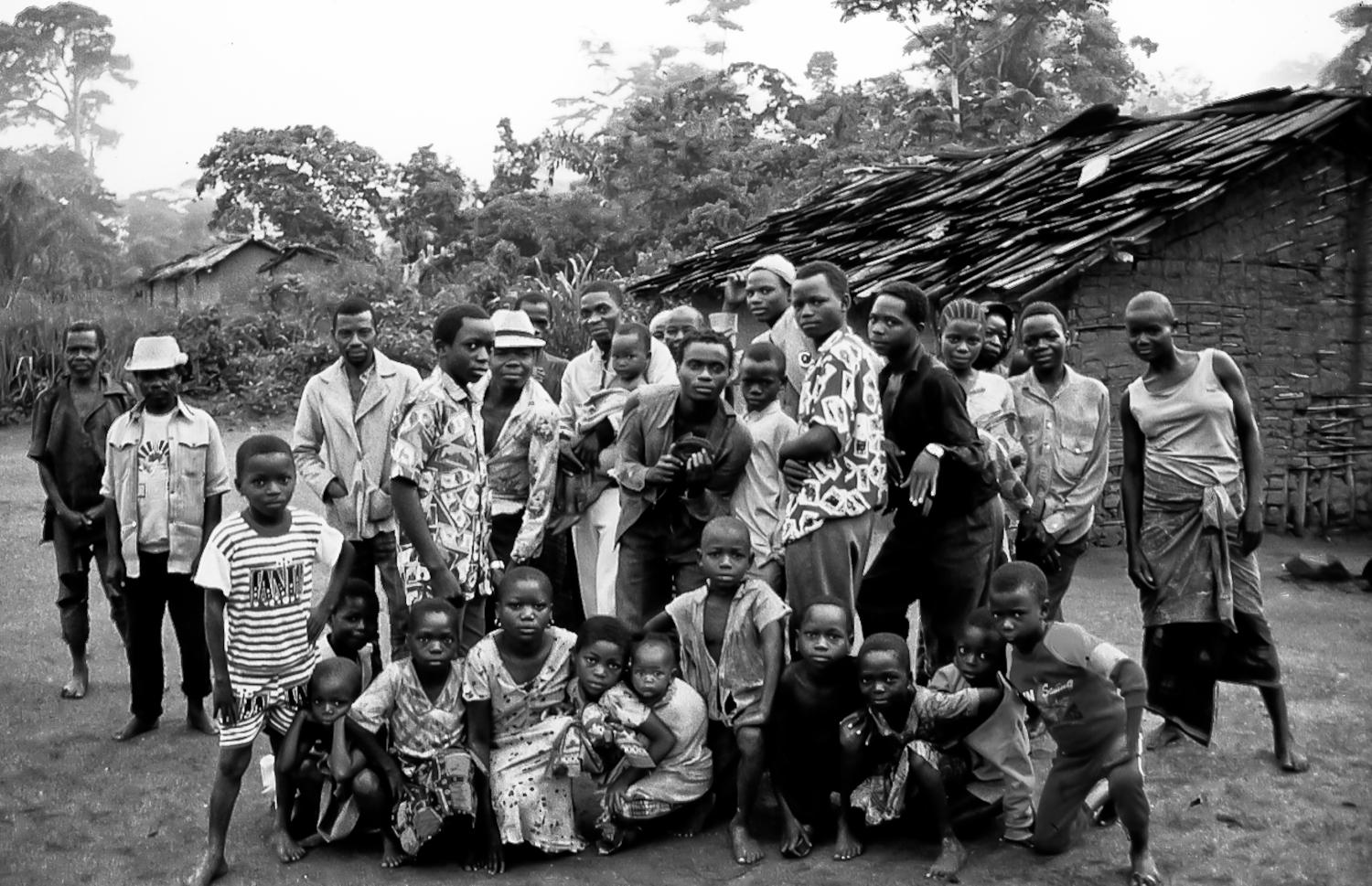
President Mobutu Sese Seko always said, "apres moi, le deluge" (after me, the deluge) and his prescient warning came true. This one entire family, the grandfather Yafali Kulu Kulu being the man in the back at far left, was believed to havebeen entirely wiped out over the course of the "first" and "second" Congo wars and the cataclysms that followed. The photo was taken in June of 1991, in what was then Zaire, now the Democratic Republic of the Congo. I am still attempting to find any of the people in it.
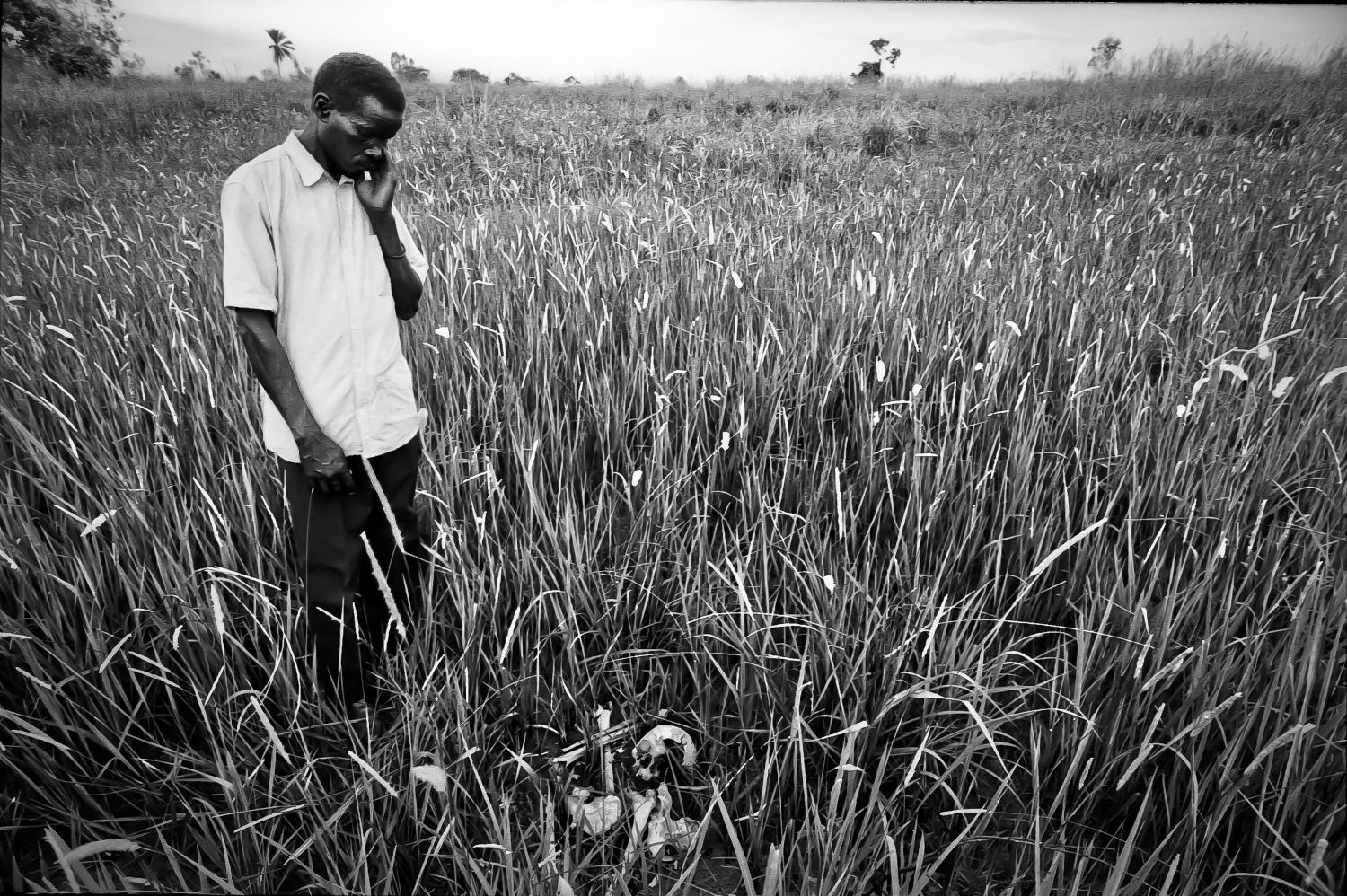
* A local man stands over the skeletons in the fields of a village outside of Bunia in Orientale province, DRC, where Hema and Lendu tribes -- manipulated and provoked by the interventions from Uganda -- killed each other by the thousands. This photo was eliminated from the final edit submitted for the SDN "Documentary Matters" call for entries, because several people suggested it was "too posed". It was, however, a very organic moment, where the man who lived in the region stopped to ponder the horror that had taken place and the remains of the dead still present and exposed for all who dared to see.
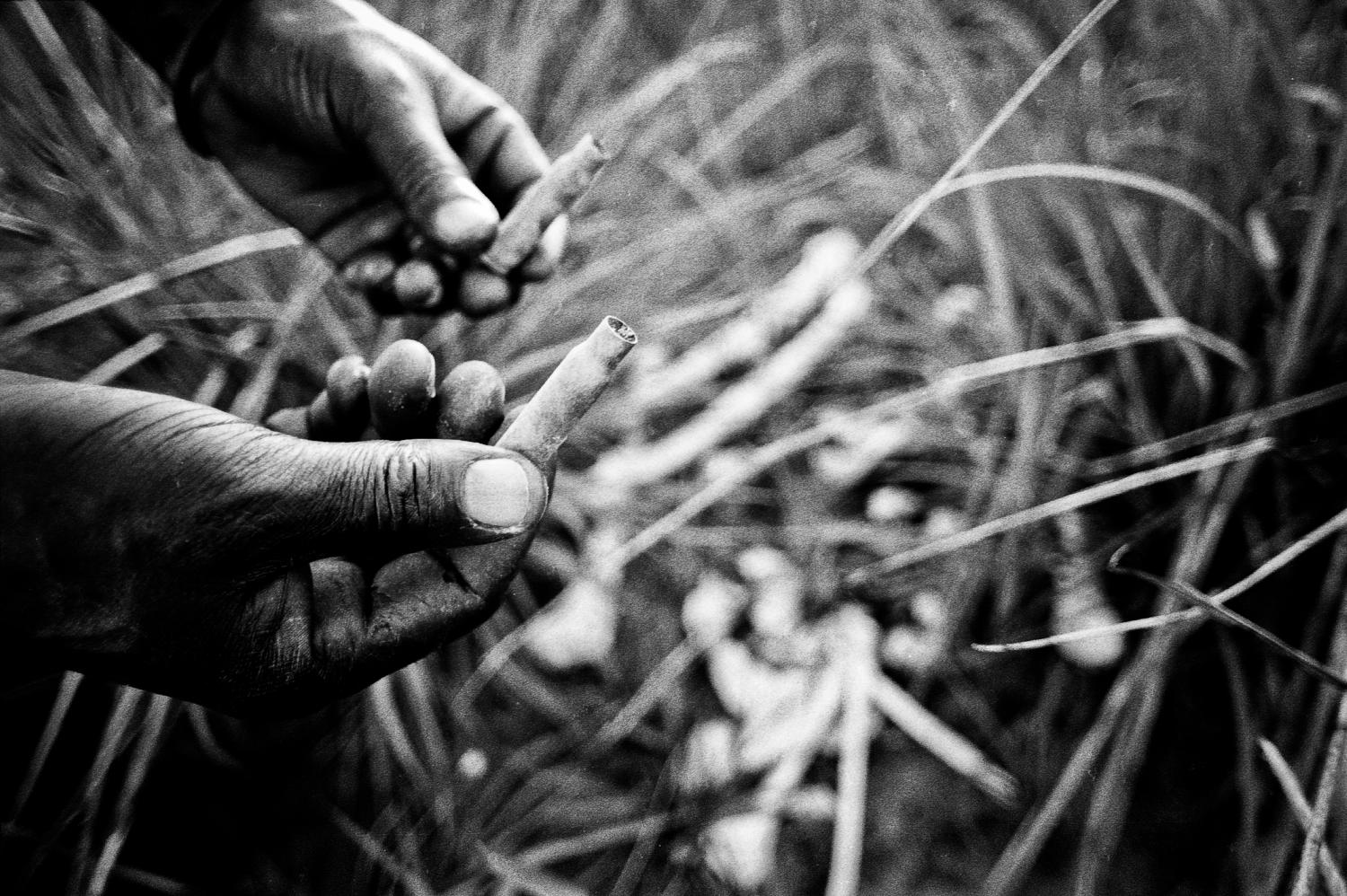
A local man inspects the shell casings in a grassy field littered with hundreds of skeletons killed during the ethnic clashes between the Hema and Lendu people in northeastern DRC. Much forensic evidence has been destroyed, hidden, or removed by soldiers seeking to protect their interests, and many mass graves sites have not been disinterred and are protected from discovery or identification even today; the local people know where they are and "disappearing" of ("meddlesome") people remains commonplace in most of the great lakes states.
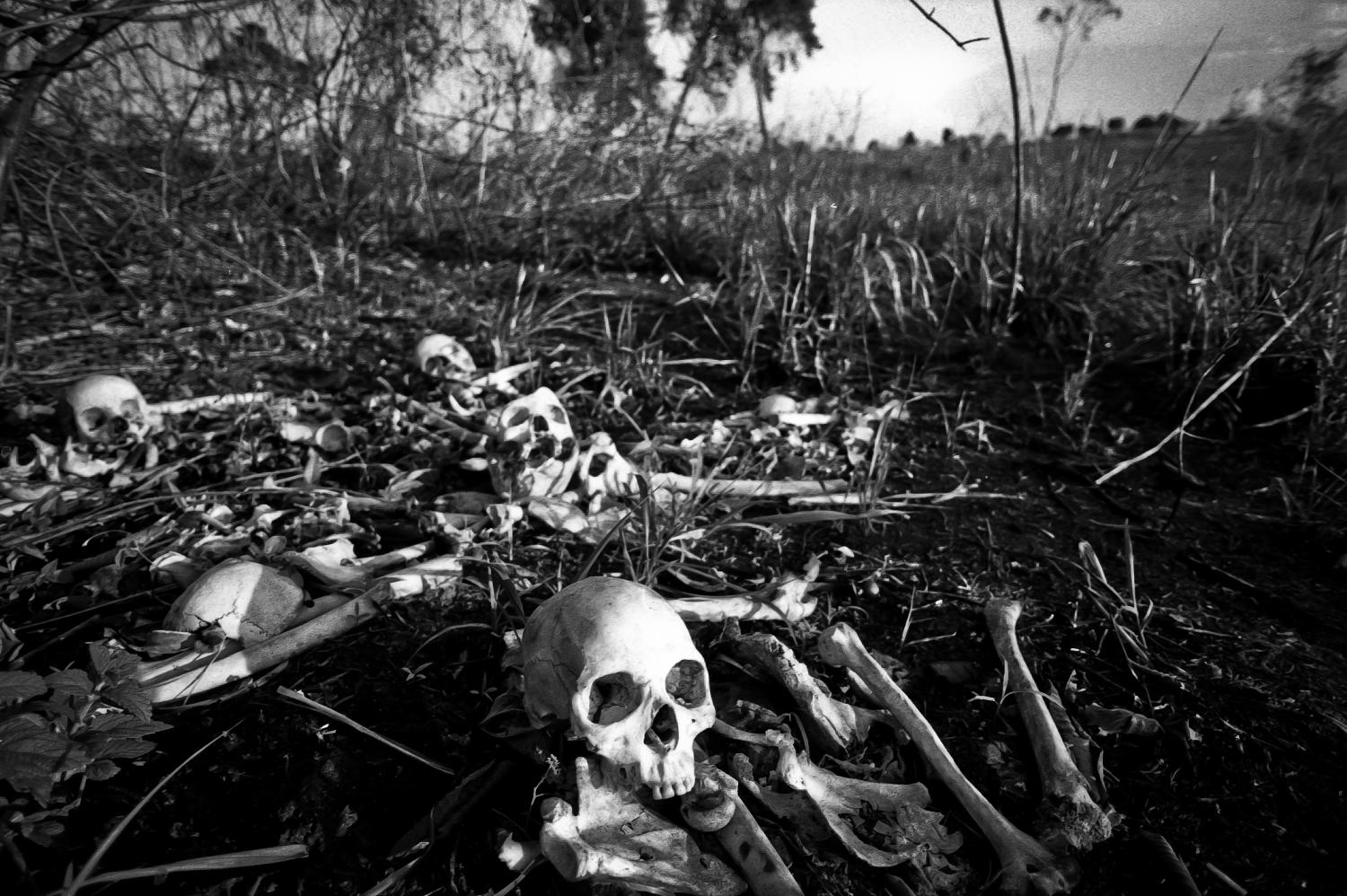
Bones and skulls litter a grassland near the village of Bogoro in Orientale province, DRC -- a brown grass savannah littered with hundreds of skeletons from the innocent non-combattant men women and children massacred during the ethnic clashes between the Hema and Lendu people in northeastern DRC. The elite criminal regimes in Rwanda and Uganda have disinterred and obliterated the remains of the dead from many mass graves in Congo, and in their own countries they have created museums of skeletons and skulls to serve the genocide industry and manipulate public opinion: dead men tell no tales.
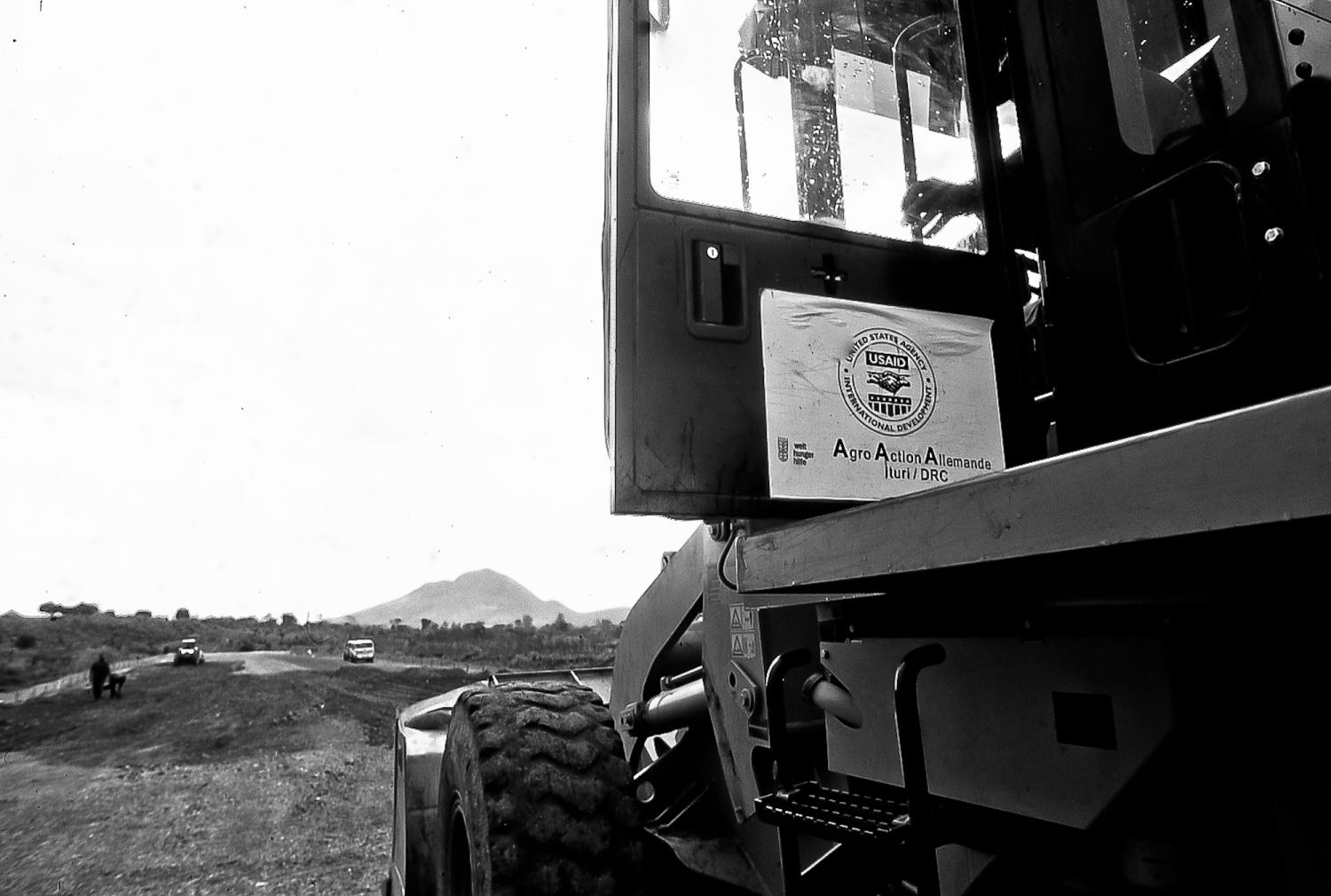
* A USAID-funded project where a grader works on the construction of a airport runway to serve western mining companies operating in the Zani region of DRC's Orientale Province. No matter the bloodshed, most of the western "owned" extractive industries in DRC continue to get the product out.
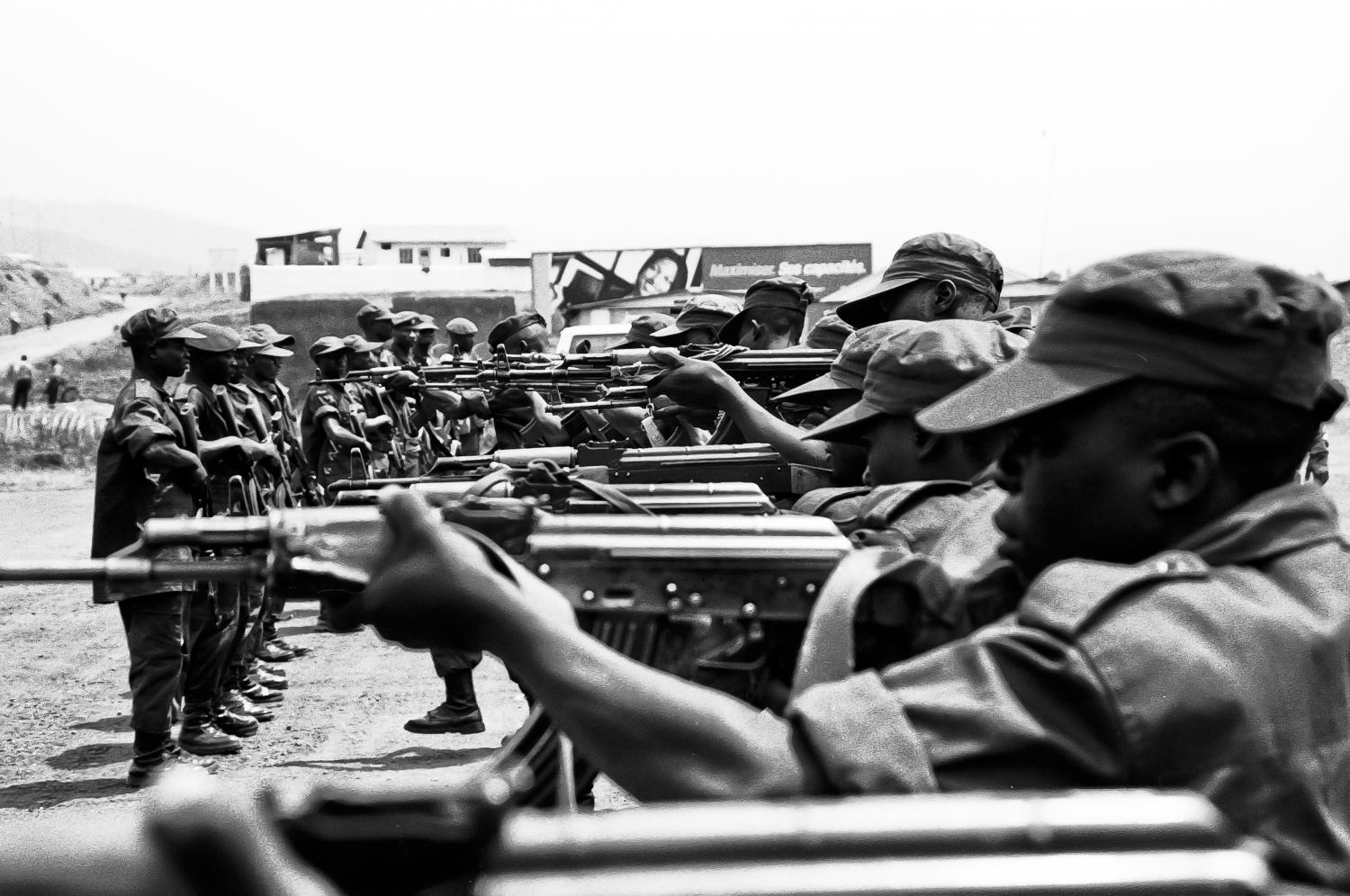
The Armed Forces of the Democratic Republic of Congo (FARDC) training for combat in Bukavu, DRC.
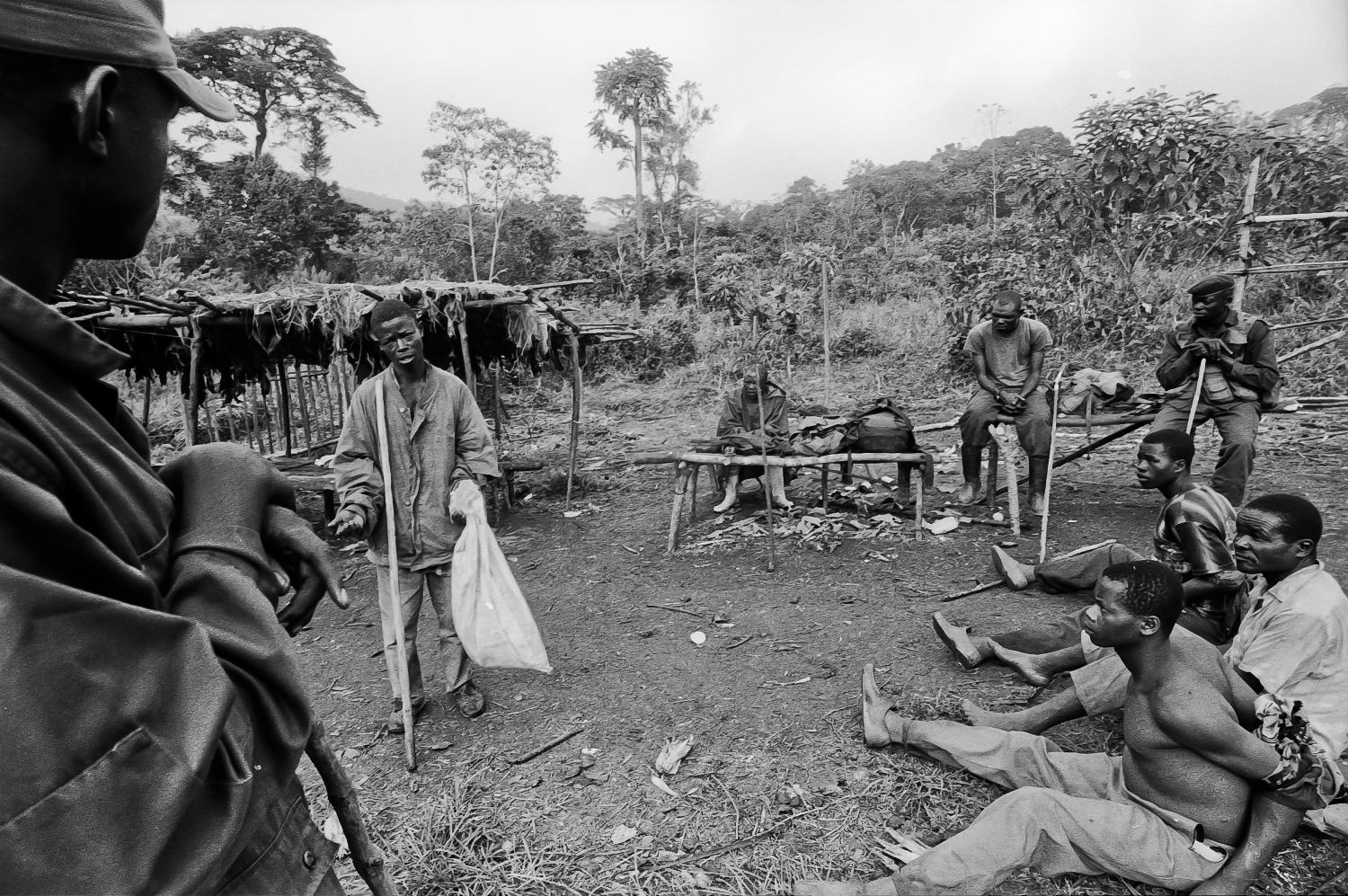
A peasant pleads with a FARDC commander for the lives of his family members and friends (who sit tied up at right) taken captive during a military patrol in the Kahuzi Beiga National Park in South Kivu, DRC, 2006.
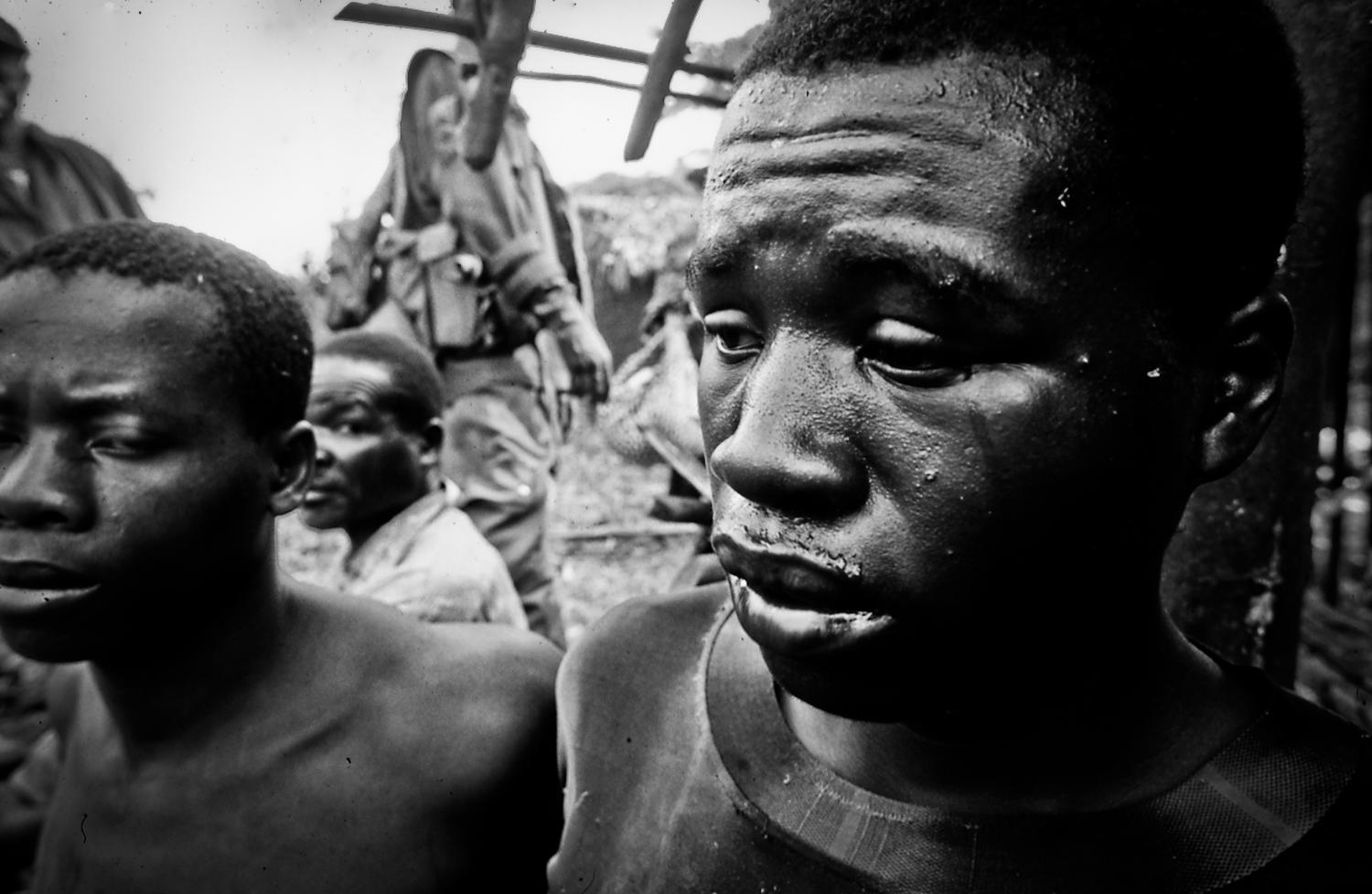
Accused of being Hutu soldiers or sympathizers of the Forces for the Democratic Liberation of Rwanda, three young men in civilian clothes taken captive -- their arms bound at the elbows behind their backs -- await the decision about their fate. The youngest man (a teenager age unknown) at right was hit in the eye with a rifle butt, causing blood and tears to flow, after protesting the soldiers' abuses. In the absence of a journalist (unlike this situation), many such captives have been extrajudicially executed on the spot (by all sides).
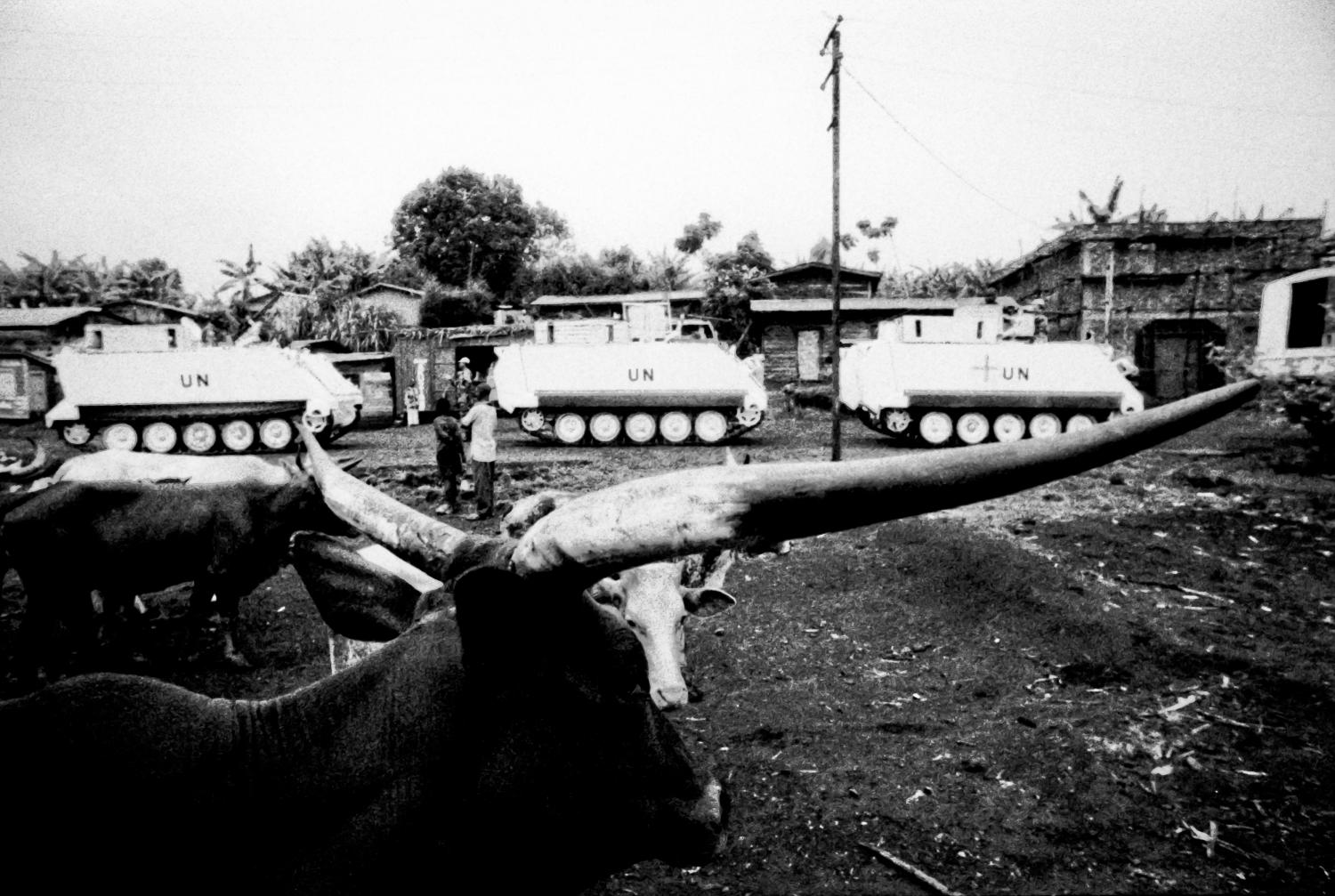
Three UN Armored Personnel Carriers pass through a local village on a mission deployed in South Kivu, DRC, in the early morning hours just after dawn.
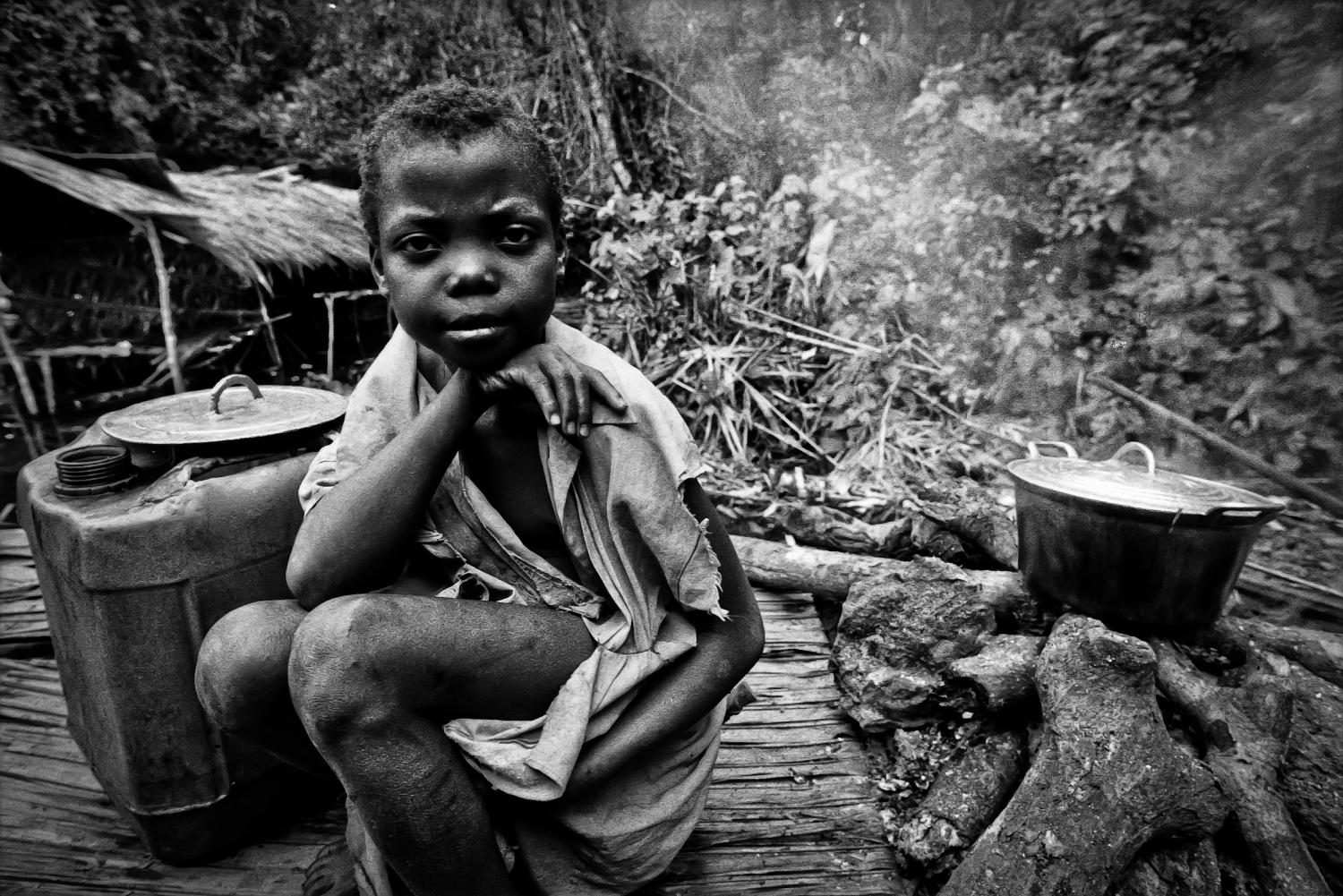
Millions of innocent non-combatant men, women and children have suffered the direct and residual affects of the constant perpetual warfare in the great lakes region. Internally displaced persons and refugees from the great lakes countries have counted in the millions, with arguably far more than 8 million dead in the Congo since the invasion of 1996.
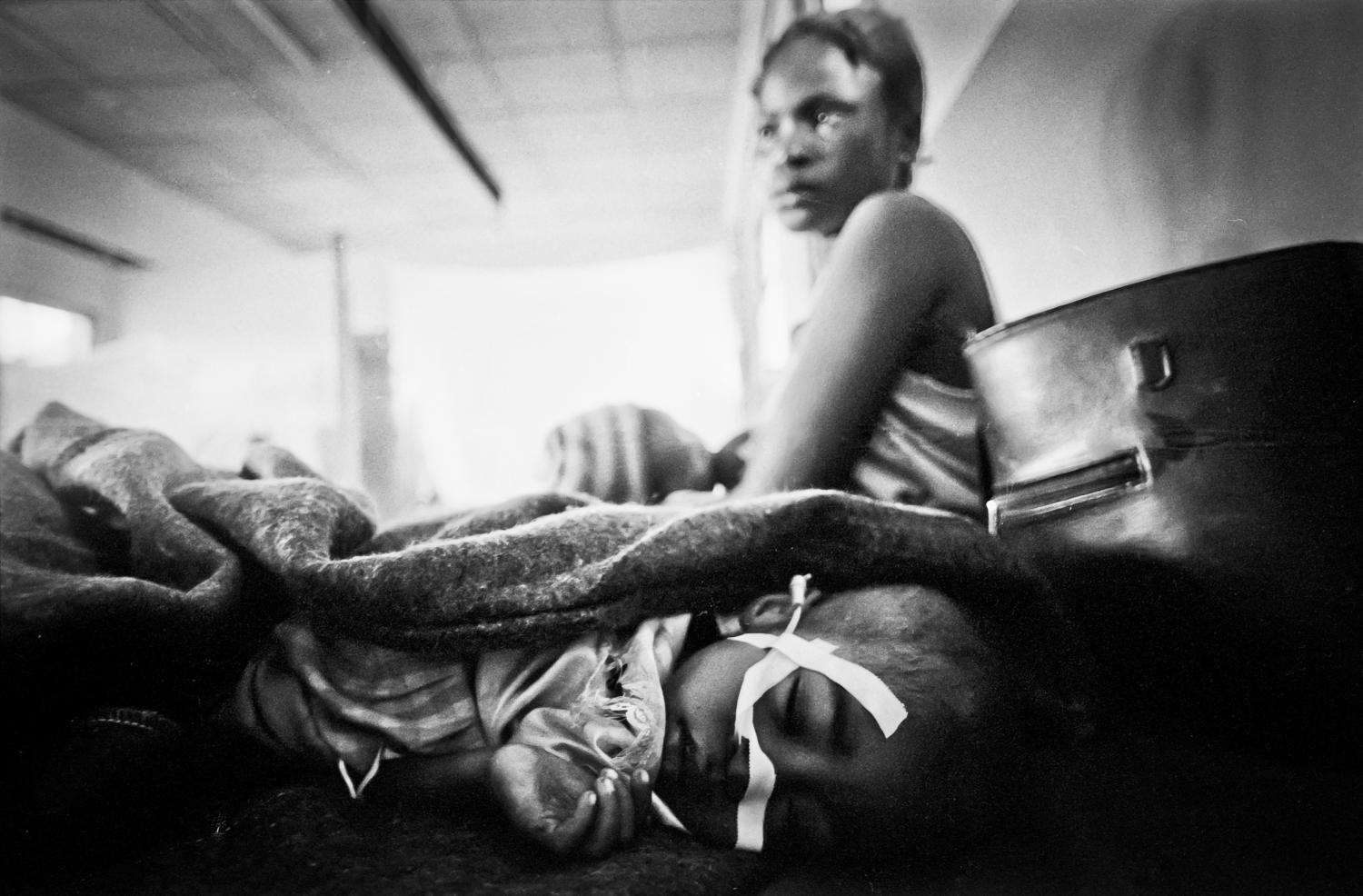
A mother whose tears fall and drip onto the bed sits near her suffering child in a hospital staffed by locals and foreign doctors from Medicines Sans Frontieres (Doctors Without Borders). Hospitals like this one often have inadequate staff, and almost nothing for resources, medicines or infrastructure. The mother was powerless to save her child, who died a few hours after this image was taken, no matter the valiant efforts by the doctor. The Belgian M.D. working at this site in Congo resigned from Medicines Sans Frontieres after realizing that MSF policies and logistics and programs were unethical and amoral.
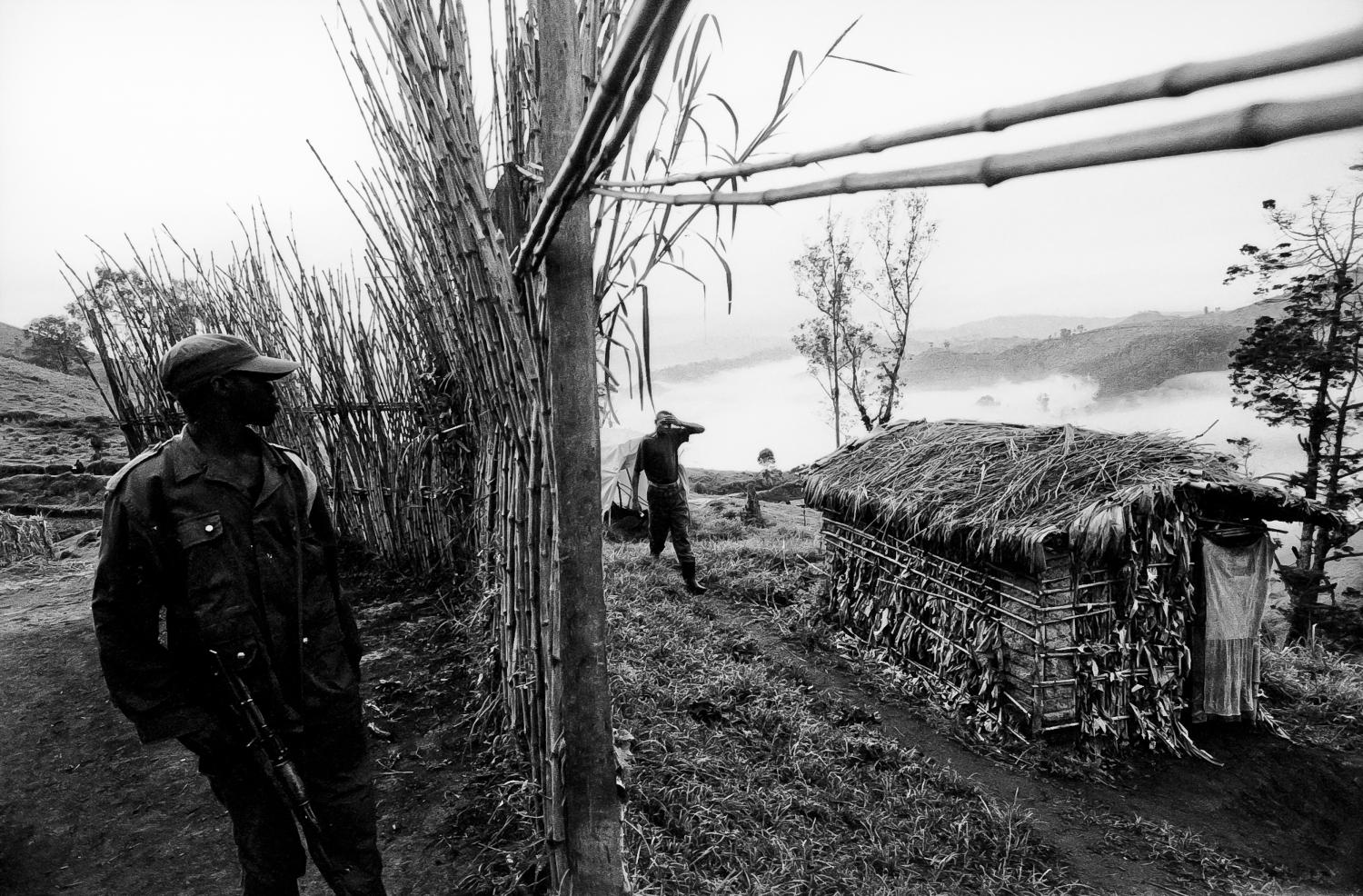
A FARDC soldier patrols a mountain ridge over a remote fog filled valley just after sunrise in a military camp in North Kivu, DRC, where the influence of Rwanda and Uganda has been heavy and the human toll unquantifiable.
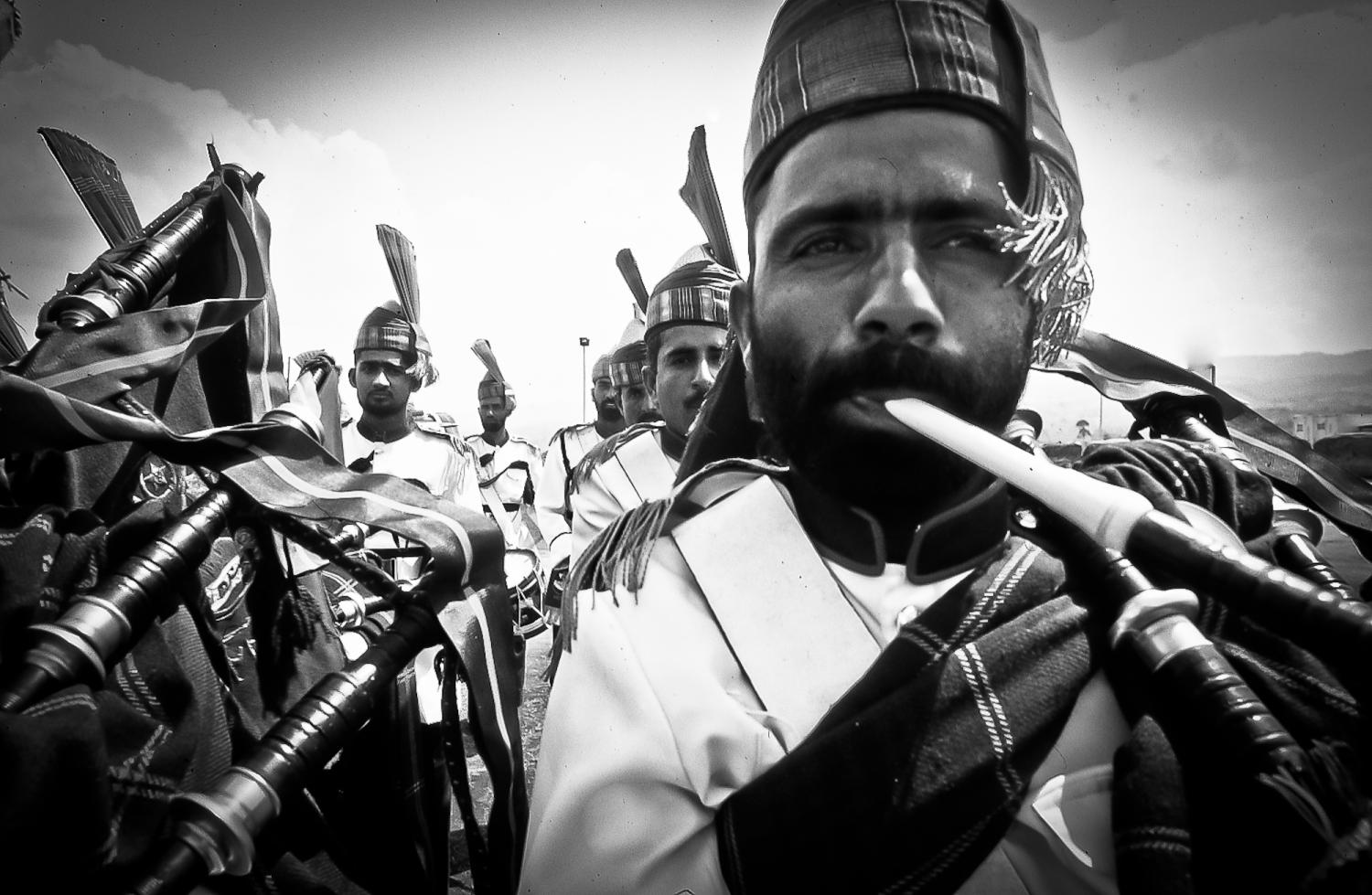
* MONUC/MONUSCO troops from the Pakistani contingent parade around the cricket field before and after the MONUC "peacekeepers" from Pakistan and India met for a Sunday afternoon game of cricket at their base in Bukavu, South Kivu, DRC. The MONUC / MONUSCO occupation forces in Congo are one large part of the managed permanent warfare in Central Africa -- and the UN troops are, arguably, nothing more or less than mercenaries.
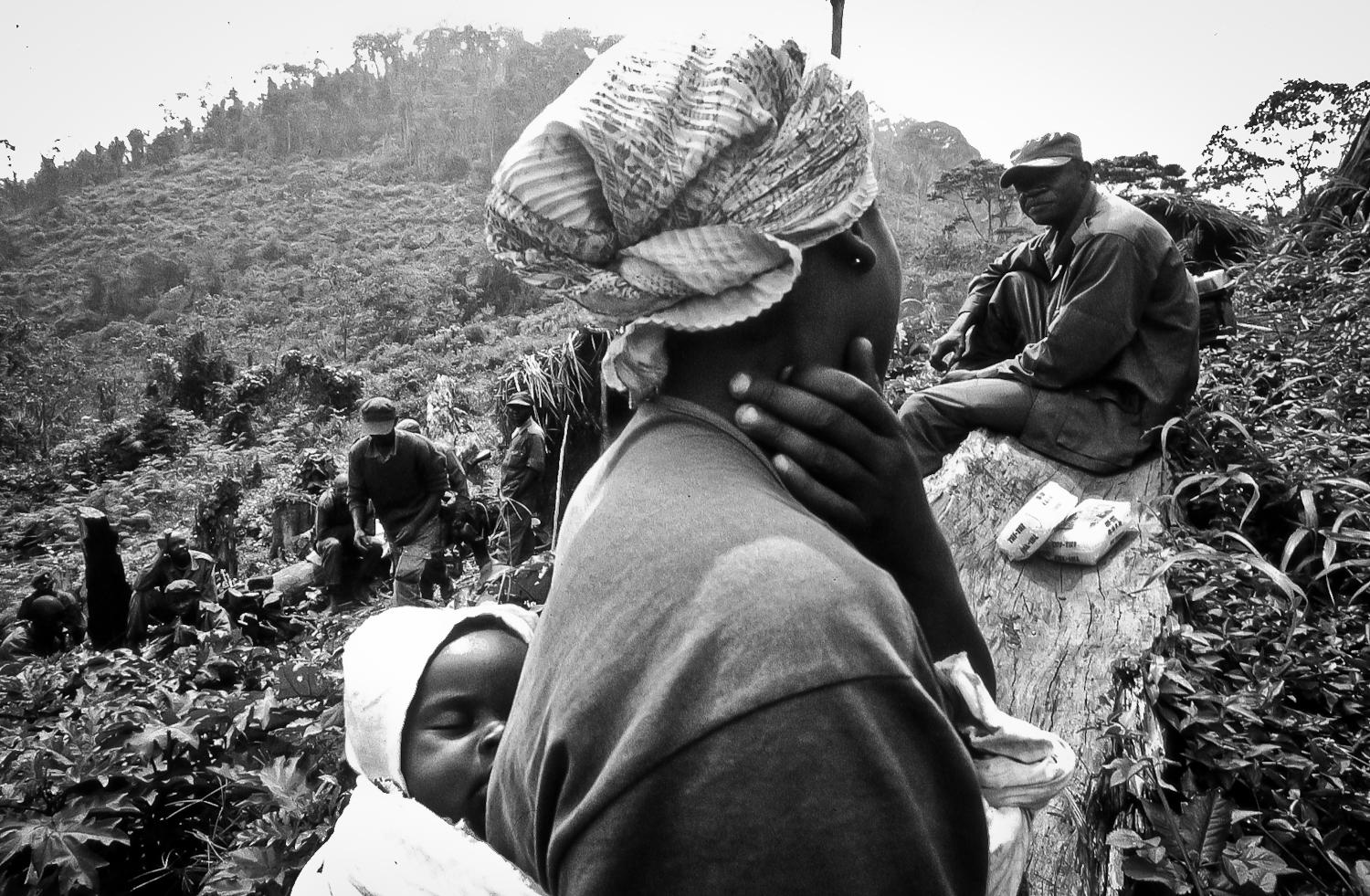
A terrified young mother pleads with a FARDC commander Captain Chiko for the lives of her husband and his friends during a military patrol in the forests along the Rwanda border where the men were taken captive and accused of atrocities.
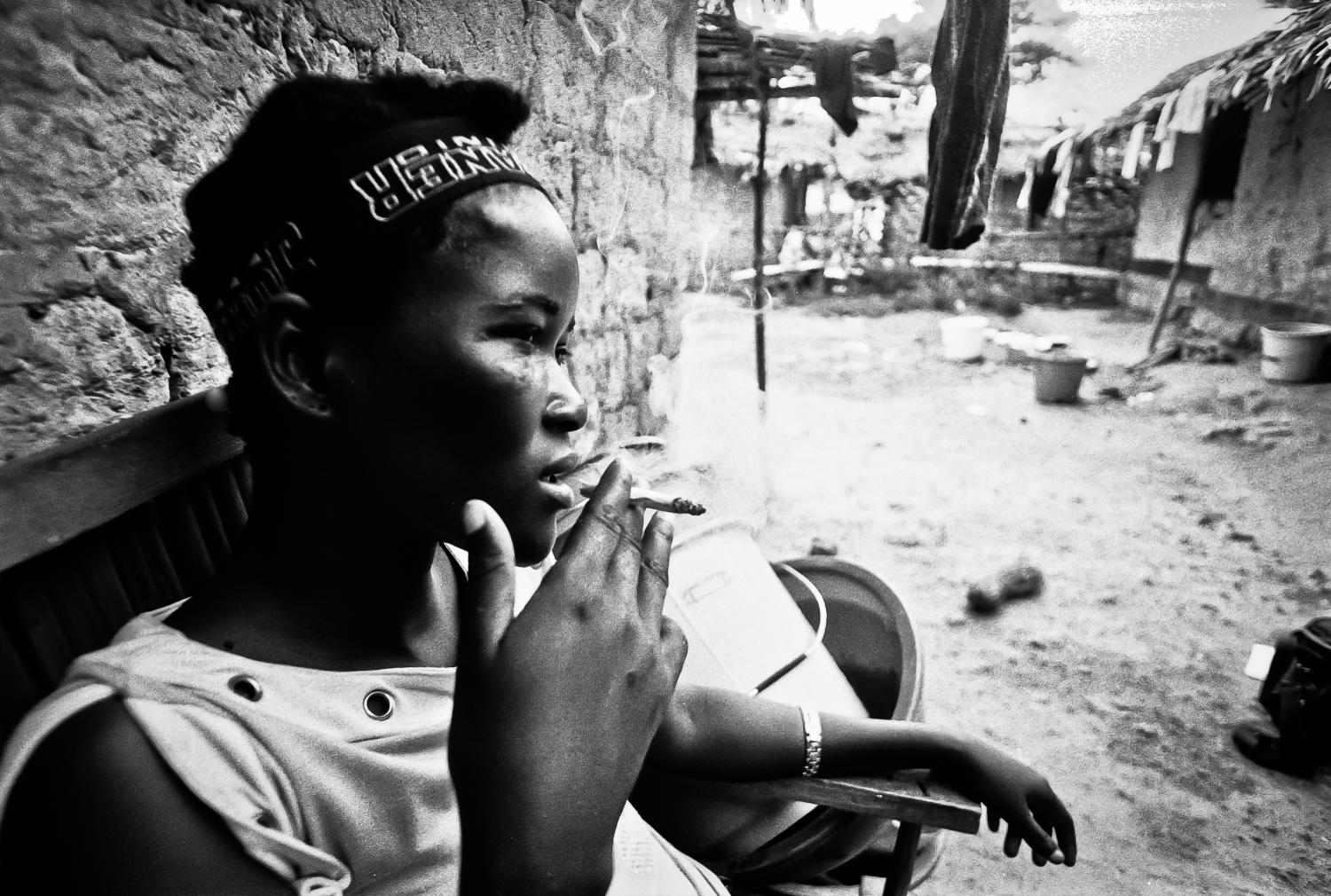
A young woman, Bebiche, seated outside her meager dwelling in Mbandka, western DRC, reflects on her circumstances. With a fresh back and blue eye, from a soldier's beating, she ponders the impossibility of making a little money to feed herself by soliciting for sex. Bebiche is one of scores of thousands of young women forced to flee their local areas in eastern Congo and walk thousands of miles across the Congo to safer areas, where they must then compete for basic survival in a collapsed economy ruled by permanent insecurity and plunder everywhere. A good day was when Bebiche was taken for the night by a UN "peacekeeper" soldier, who paid her $20 and did not beat her up; a bad day was when she was taken (first) by another armed combatant, who would pay her two dollars, if she was lucky and, if unlucky, they would rape her and beat her and take anything else from her they could. Shown a photograph taken of her taken four years earlier, where she was young and hopeful and untainted and beautiful, she asked: "Is that me?" and then she broke into tears and wept.
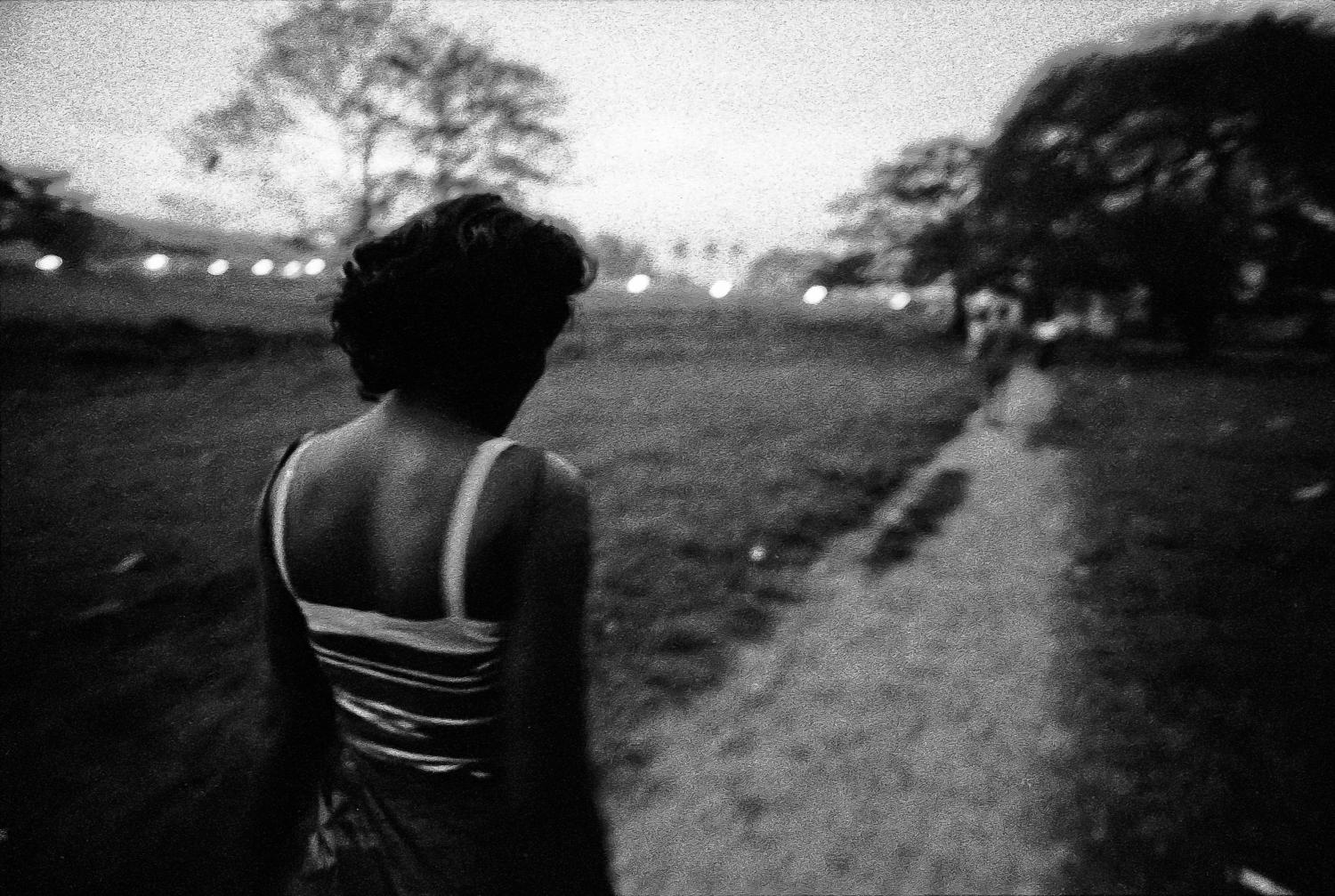
* Bebiche leaves her dilapidated dwelling at sunset to seek "work" for the night on the streets of Mbandaka, Equateur Province, DRC.
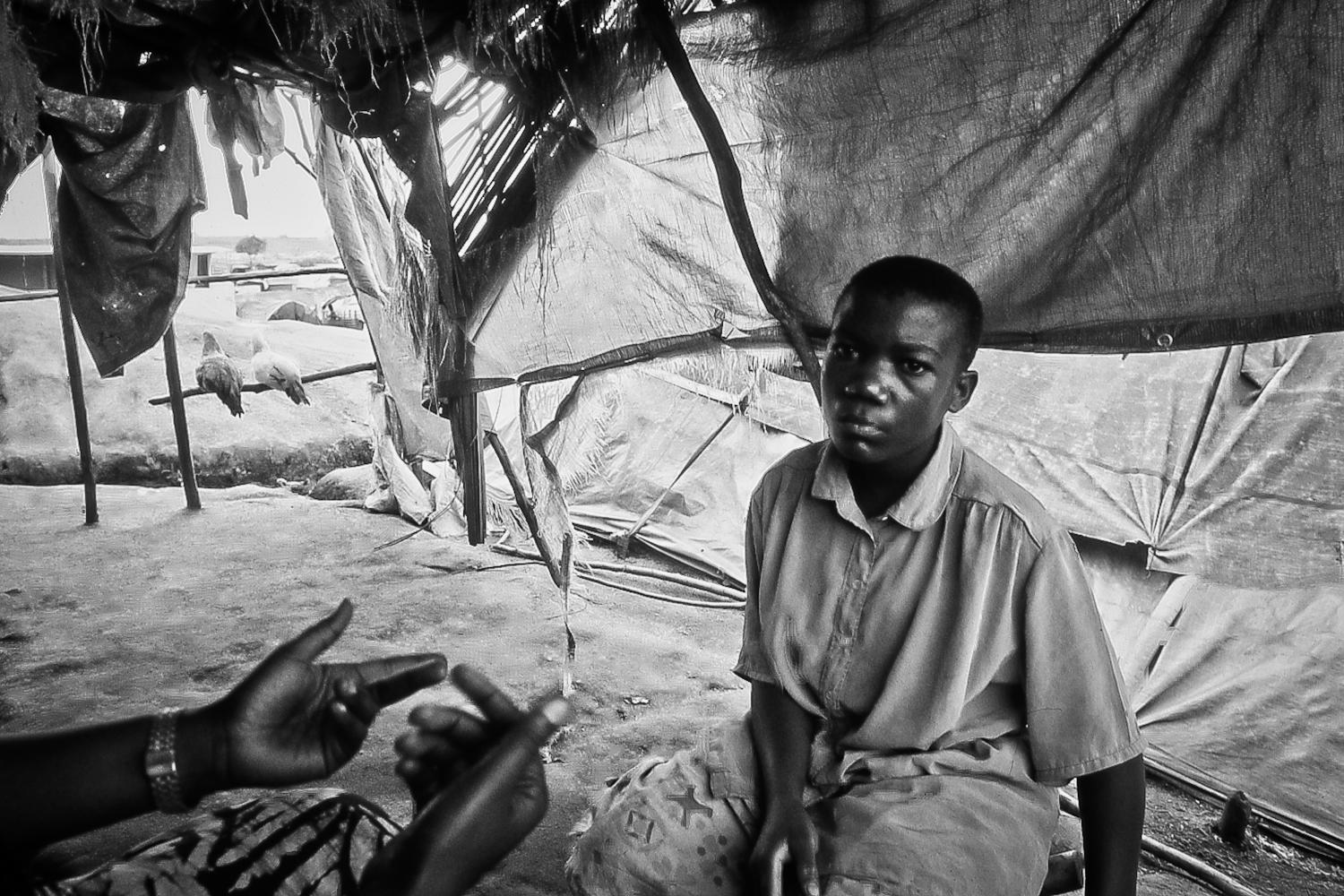
A twelve year-old girl belonging to the Mbuti (known as "pygmies" in the West) tribe is counseled at a refugee camp in Bunia, Orientale Province, about the violence and violations perpetuated on her and her people. The Mbuti people are nomads that dwell in the deep forest of Congo's Orientale province. The Mbuti were especially hard hit during the Movement for the Liberation of Congo campaign Effacer Le Tableu, and the accusations that Ugandan MLC rebels were cannibalizing the Mbuti were confirmed (to this journalist) by former MLC soldiers that had been integrated into the FARDC after the "peace treaties" of 2001 and 2003. The genocide against the Mbuti people remains highly undocumented.
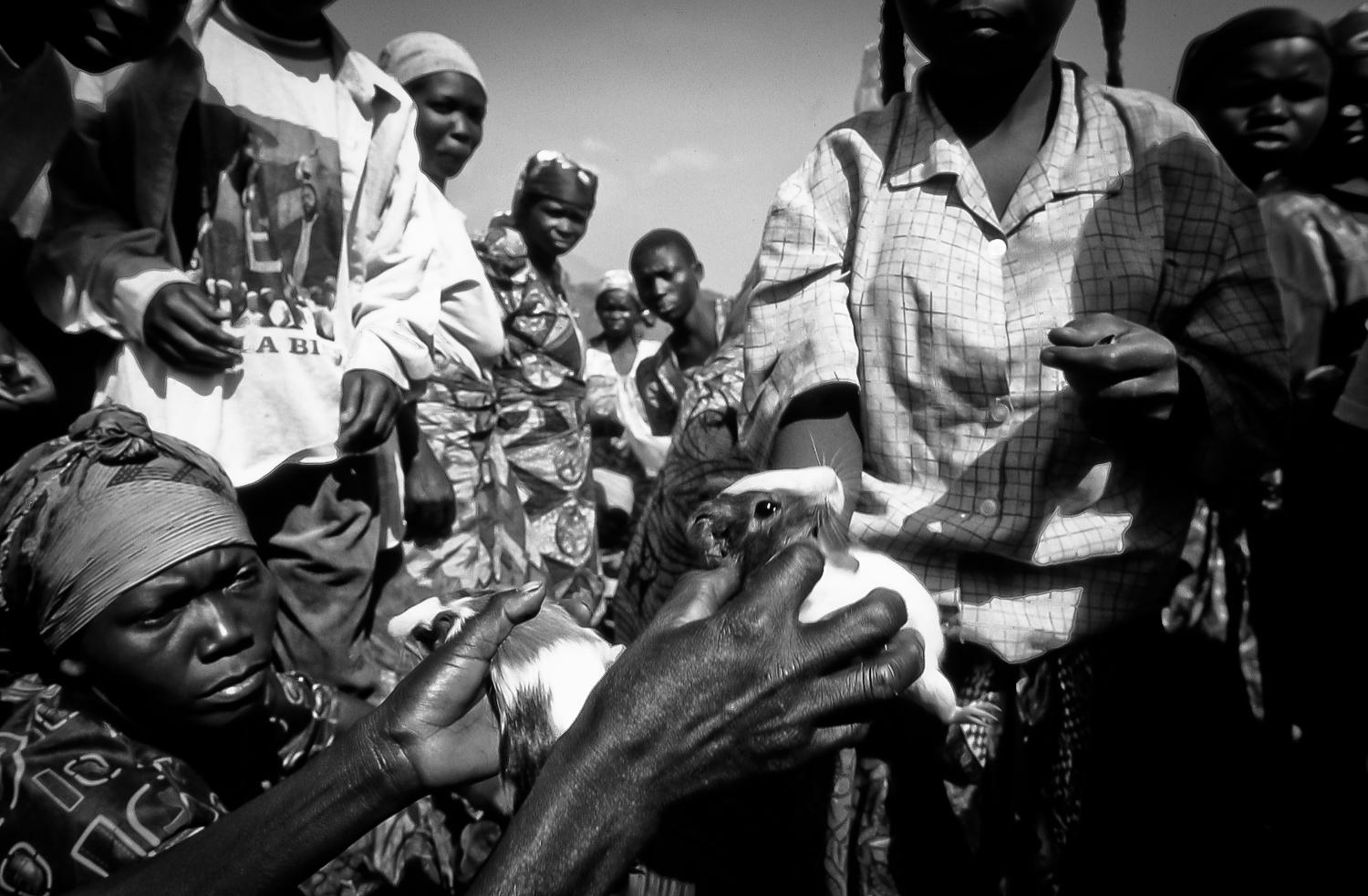
Women trading goods at a market sell guinea pigs and small rabbits -- a reliable source of protein for many people who are unable to keep livestock (chickens, pigs, goats) under perpetual attacks by known and unknown assailants. "When the soldiers come they violate us and steal everything," said one women here. "We keeps these we can hide in our clothes and try to run away."
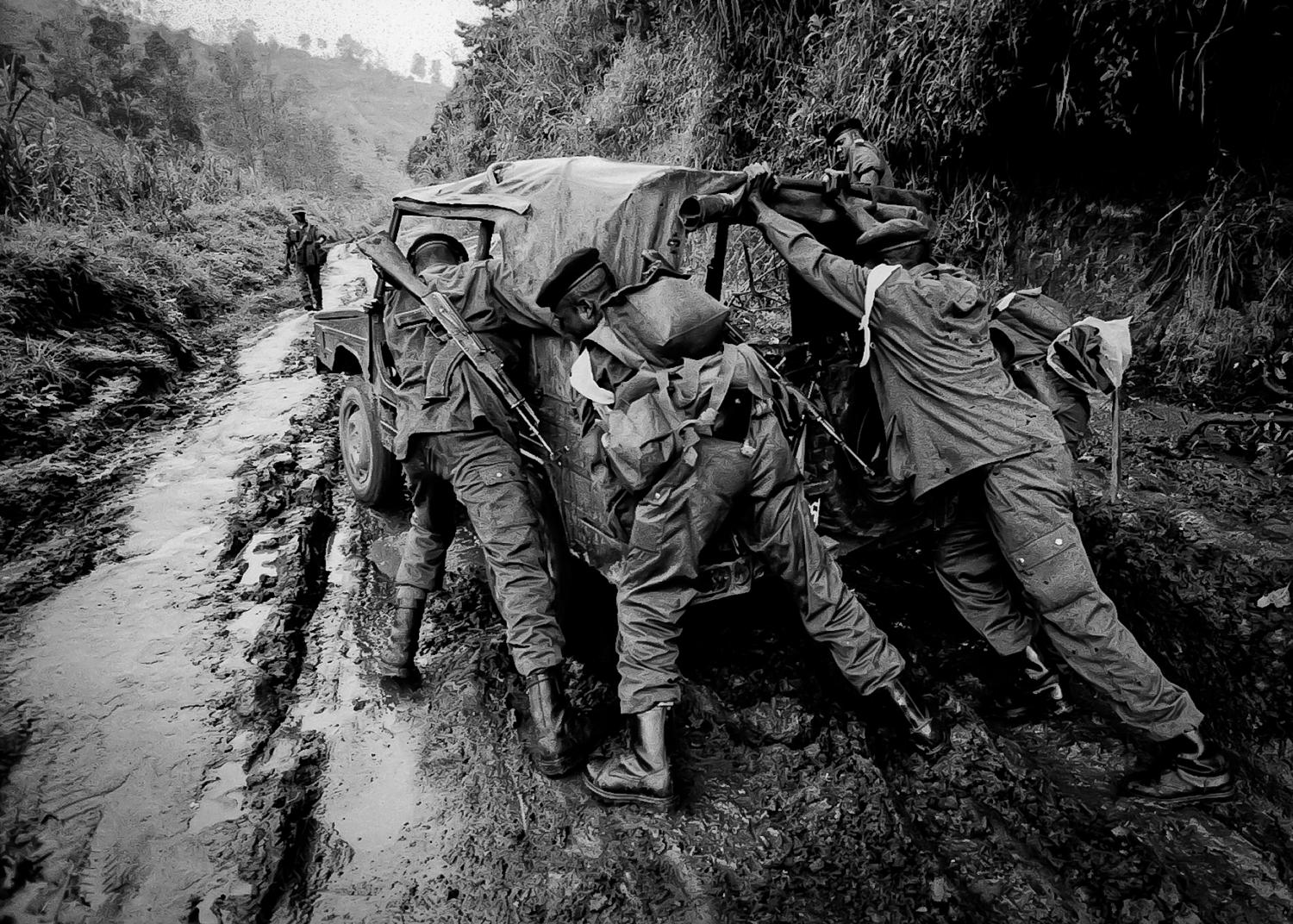
A FARDC patrol jeep gets stuck in the mud and the soldiers push it out on route in a rural area of North Kivu, DRC, north and west of Goma.
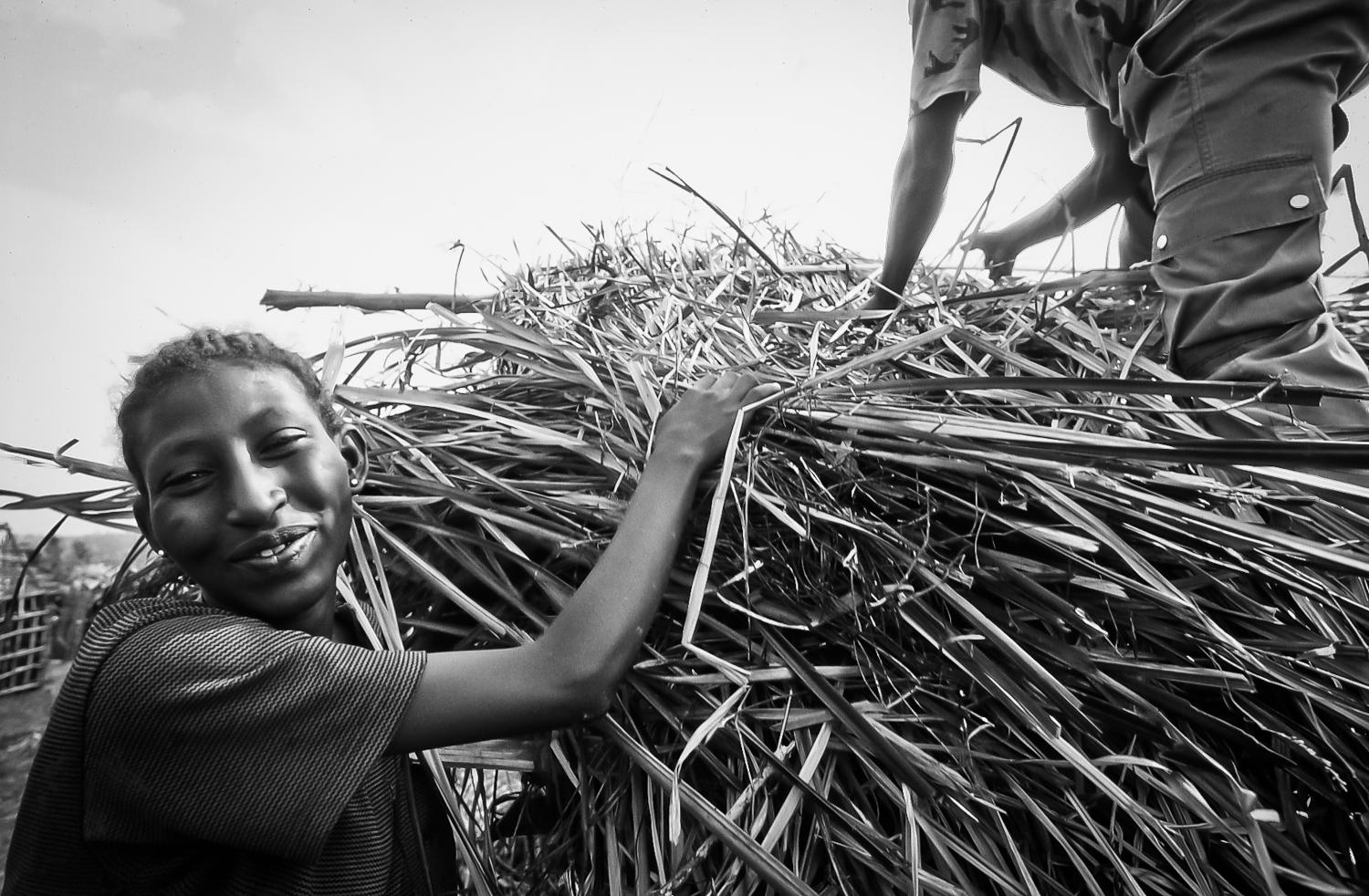
A young woman betrothed to a FARDC soldier assists her husband patching the meager straw shelter they live in at a soldiers camp in South Kivu. Amongst the many crimes of humanity committed by all sides in the great lakes conflicts are the sexual atrocities. Many women and girls have been taken as sex slaves, held captive under horrible conditions. In sharp contradistinction, many soldier's wives and child soldiers chose their circumstances based on the reality that "life with a gun" offers them some semblance of security and sense of personal power.
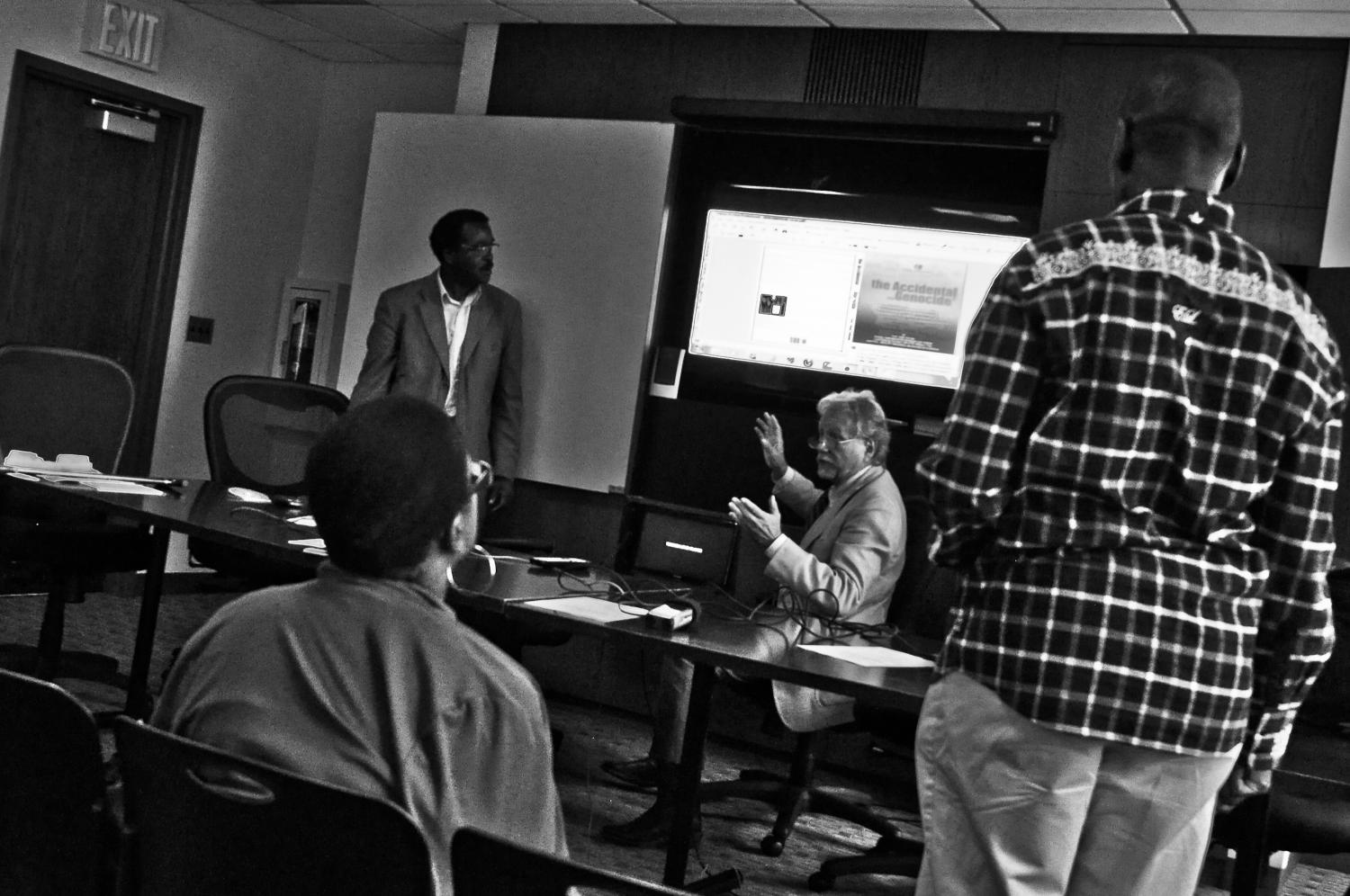
Peter Erlinder, a former defense attorney of the International Criminal Tribunal on Rwanda (ICTR) speaking at a small conference in New York City in 2012, presents information about atrocities committed in Rwanda and Congo that were documented in an extensive United Nations High Commission for Human Rights (UNHCR) investigation and released in the so-called UN "Mapping Report" . The 33 member mapping team's 550-page report (released 2010) contains descriptions of 617 alleged violent incidents occurring in the DRC between March 1993 and June 2003 and specifically documented genocide in the Congo. At left is Dr. Ya-Lengi Ngemi, author of the book "Genocide in the Congo"; at far right (back to camera) is Milton Alimadi, a Uganda-born journalist and publisher of Black Star News.
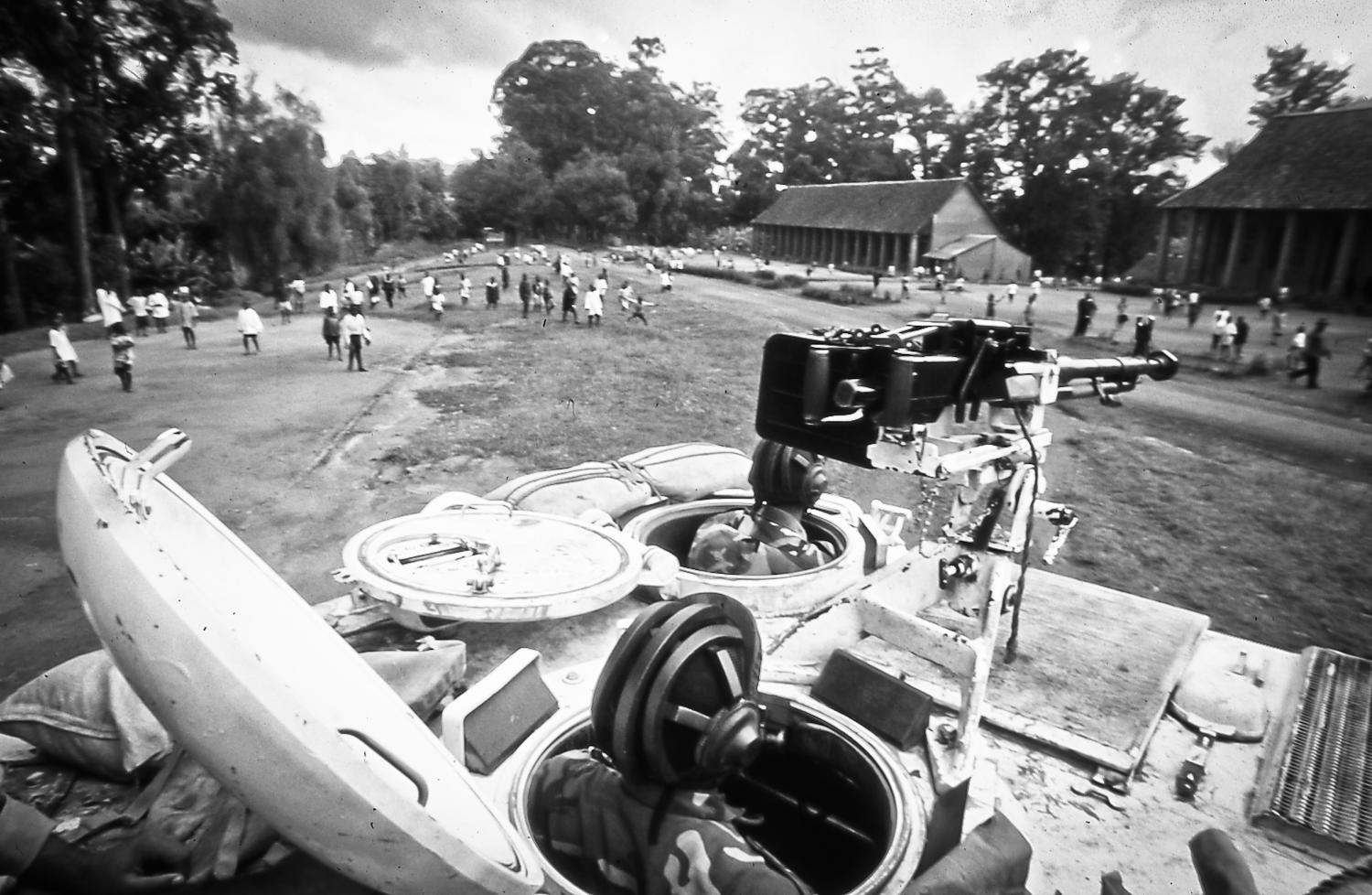
MONUC/MONUSCO forces in an Armored Personnel Carrier on patrol in the village of Mahagi, Orientale Province, look out the porthole top where a 50 caliber machine gun is ready for deployment. More than 60 different militias -- along with the national army (FARDC) and UN forces -- have operated in the frontier regions between Uganda/Rwanda/Burundi and Congo and most continue to maintain a military foothold to this day.
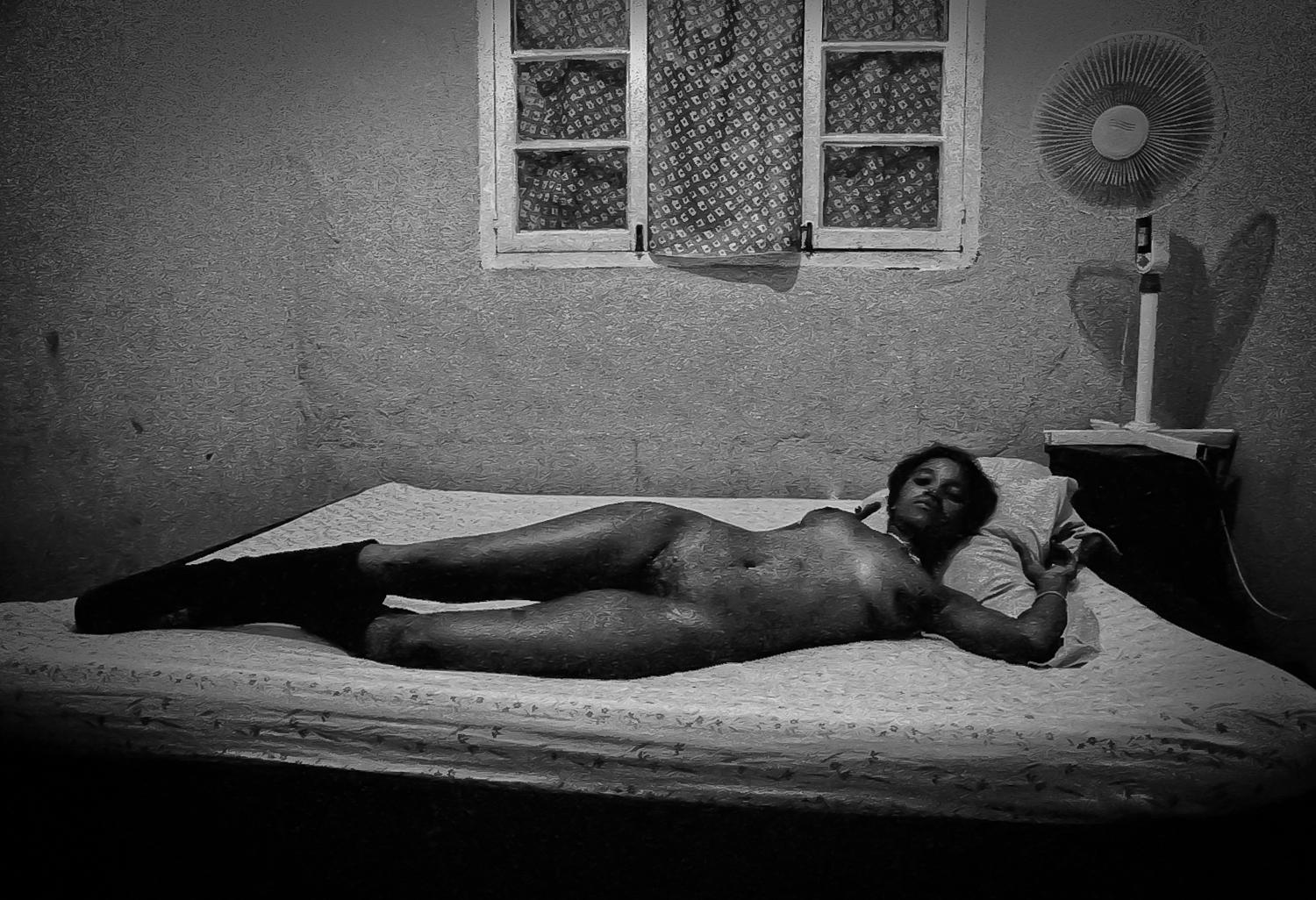
"Natalie" is a local woman who was dying of a communicable disease contracted during the course of her life of survival sex during wartime in Kisangani, Orientale province, DRC. The question of a woman's agency and autonomy over her own body is moot when soldiers routinely perpetuate mass rape, sexual mutilations and other atrocities on women. "Natalie" kept her high black boots on her legs during sexual encounters to hide the telltale lesions.
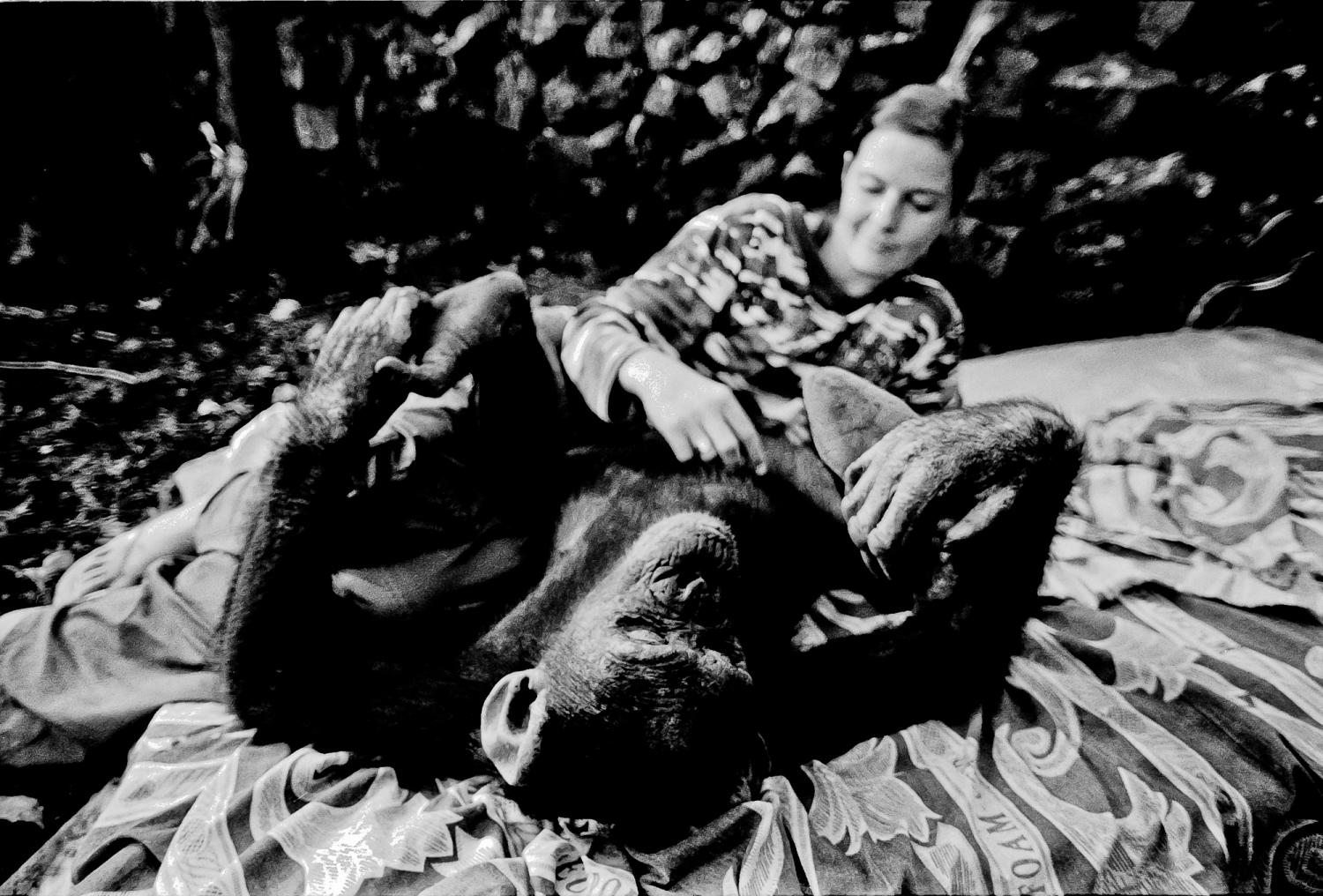
* A foreign volunteer for a Western NGO plays with a chimpanzee at a primate rescue center in Goma.
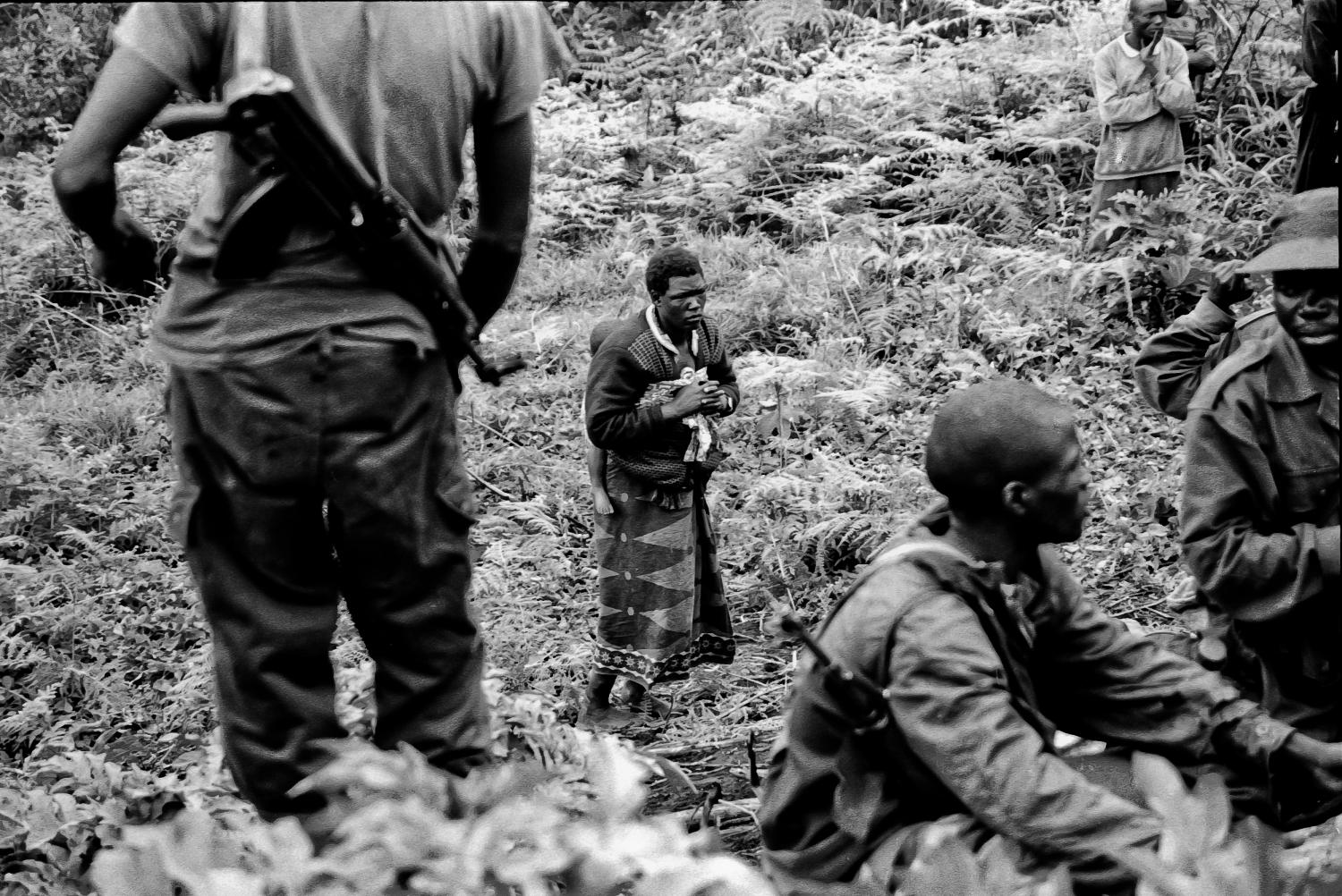
A terrified young woman stands courageously before (disinterested) soldiers that have plundered her village and taken what little food and supplies, clothes and goods she possessed, and have beaten and arrested her husband.
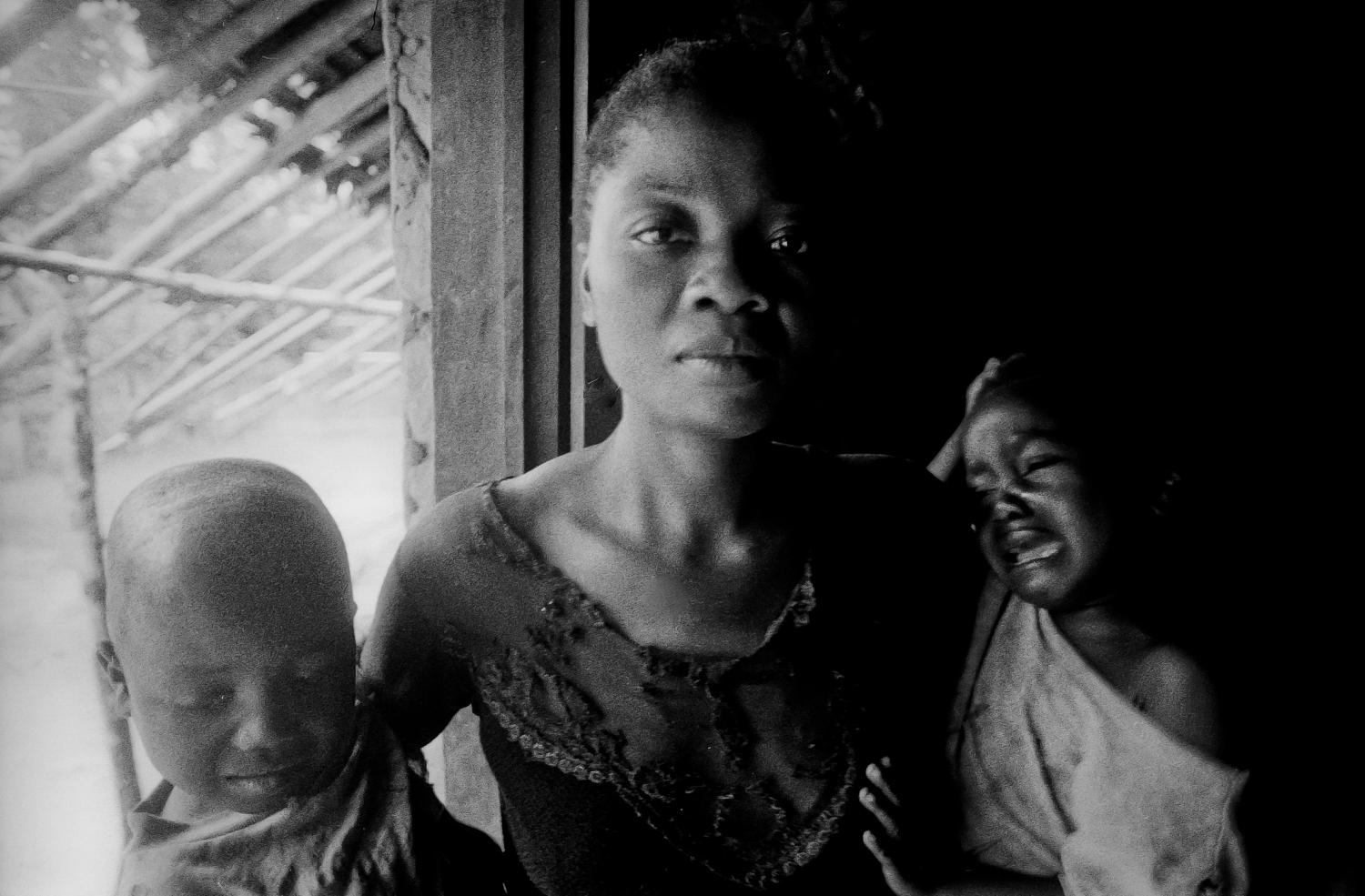
"Georgette" -- who lives (lived) in a very small village along the Ikelemba River (a major tributary of the Congo) in rural Equateur province, western Congo -- reported (to this journalist) being raped by the soldiers from six armies: Angola, Rwanda, Uganda, Zimbabwe, and Zaire (Forces Armées Zaïroises - FAZ) and/or the FARDC (Congo). Congo was never a place where sexual violence was rampant until the invasions and occupations by foreign armies and militias. "Georgette" loves her children, and she remembers the faces of the men who did it, though she has no idea who they were.
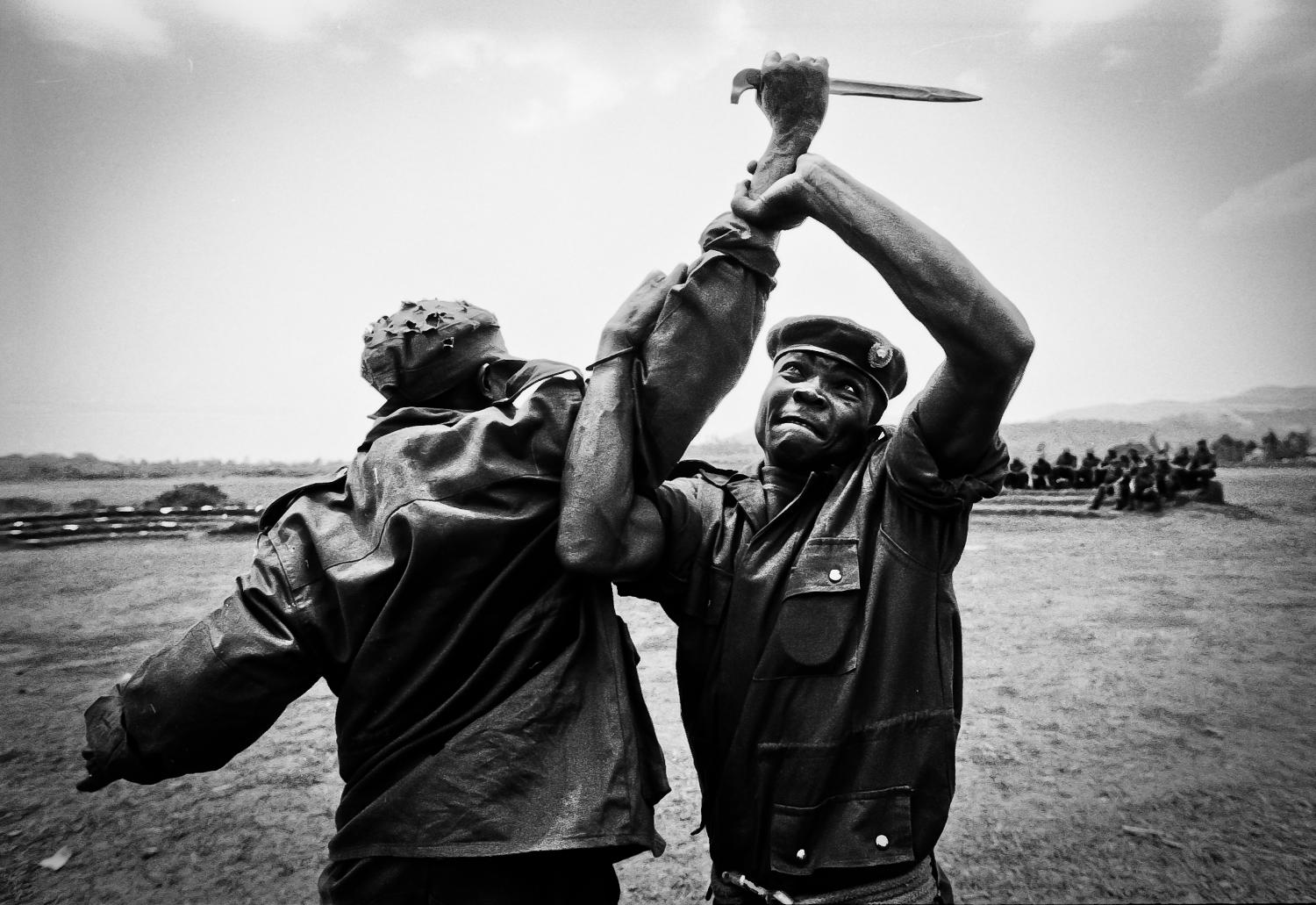
Two FARDC soldiers practice hand to hand combat techniques based in Chinese martial arts and under the supervision and training of UN experts. The Armed Forces of the Democratic Republic of Congo are comprised of many ex-combatants that were once directly at war with each other. This UN-brokered arrangement known as DDRRR (Disarmament, Demobilization, Repatriation, Reintegration and Resettlement) of foreign armed combatants.
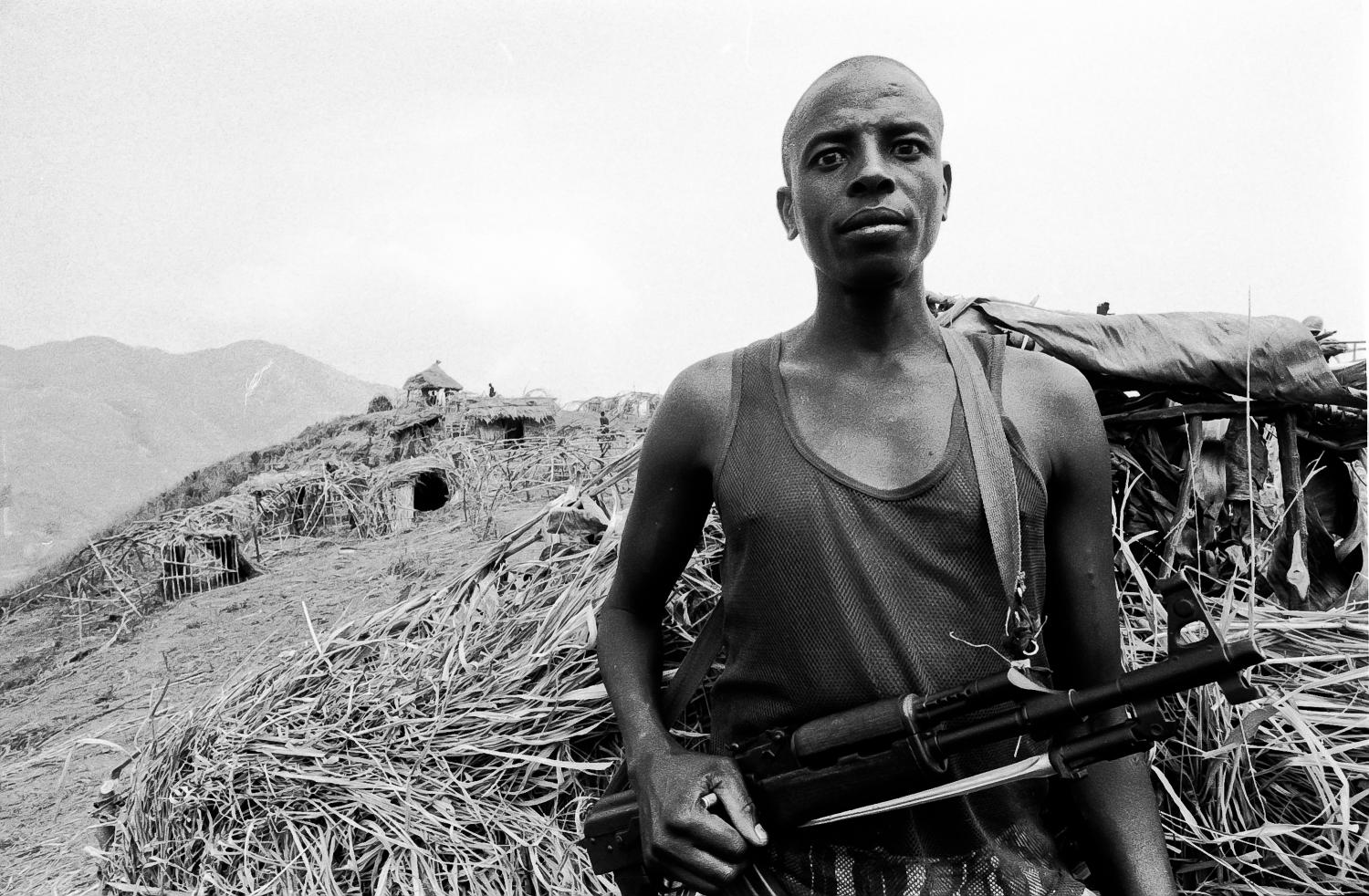
A Rwandan Hutu soldier of the Democratic Forces for the Liberation of Rwanda (FDLR) stands guard with his chin held high commanding respect in the backwater hills of South Kivu. Accused of having perpetrated genocide in Rwanda, some contingents of FDLR have occupied parts of North and South Kivu since 1994.
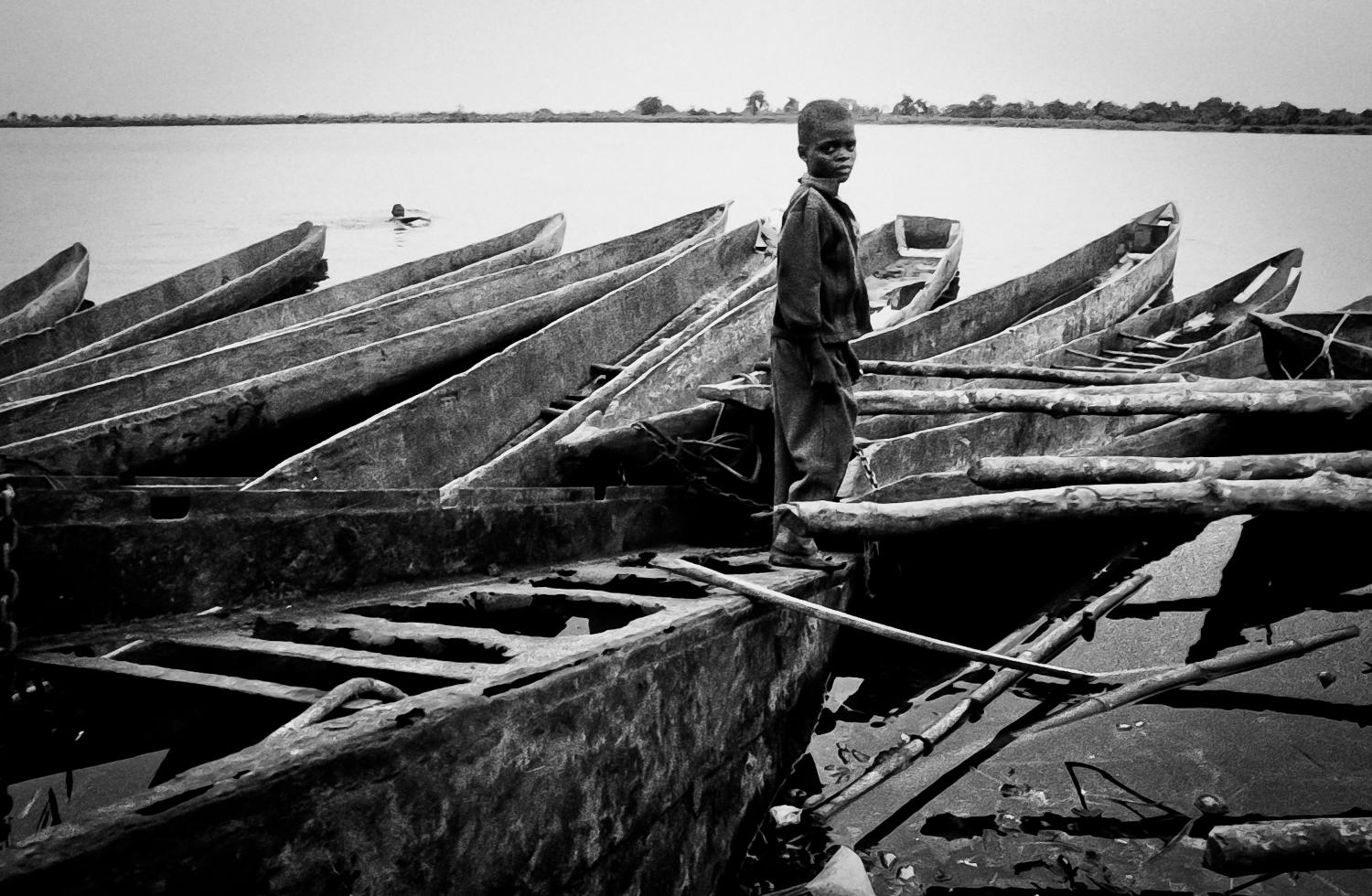
A child stands on the dugout canoes moored at the "beach" at Mbandaka in far western Congo. Thousands of innocent non-combatant men, women and children that survived the forced flight across the entire Congo in front of the massacring troops of the Armed Forces for the Democratic Liberation of Congo-Zaire (AFDL) crossed the Congo River in dugouts here only to be slaughtered on this beach, their bodies thrown in the river and disappeared. Soldiers routinely conscript and confiscate the boats of local people living on the rivers and lakes in Congo.
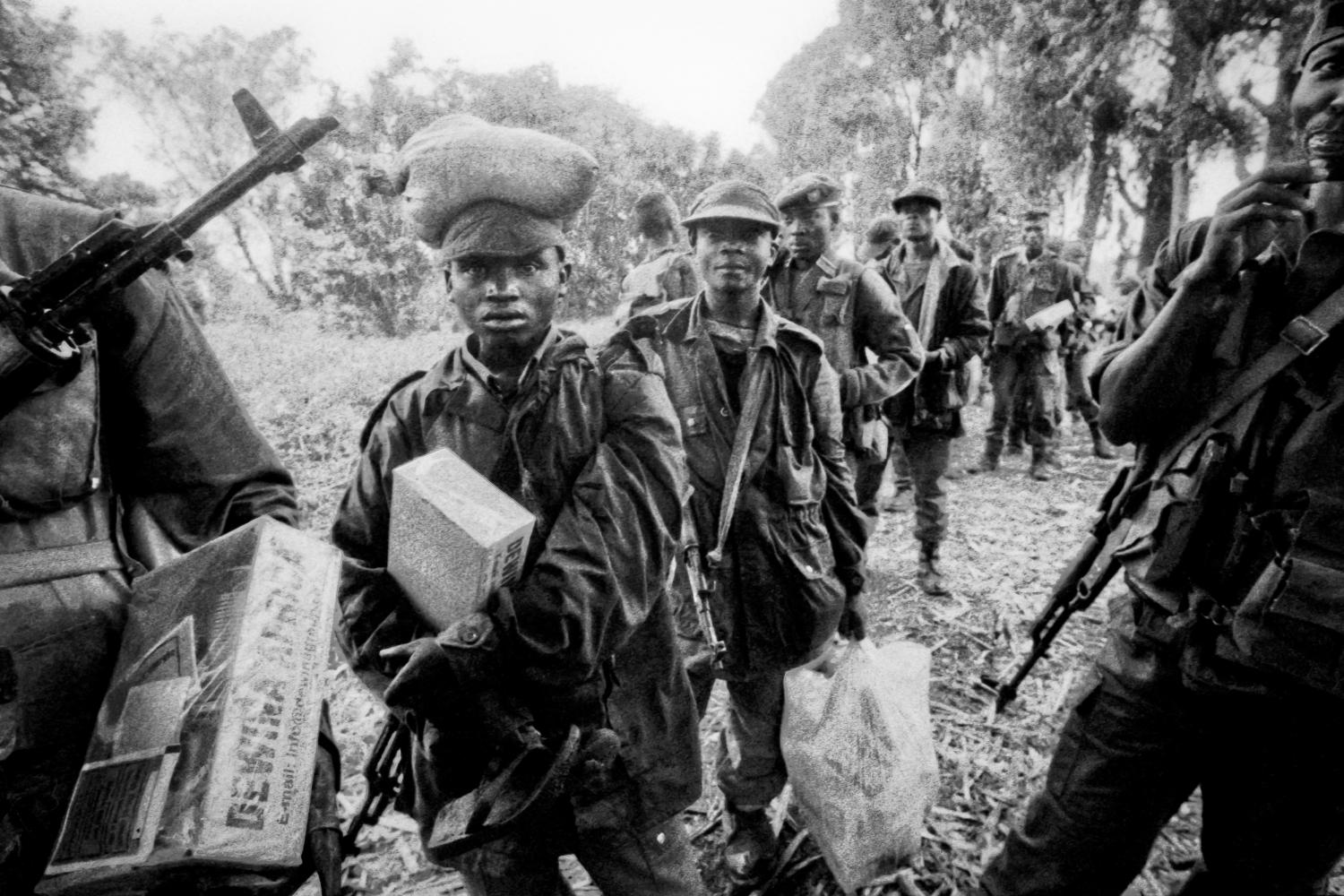
Conscription of children into militias and national armies occurs throughout the region and by all sides. Children are often conscripted from schools, denying them a basic education along with a childhood. At the bottom of the military hierarchy, the children endure extremely harsh living conditions and forced labor, and military commanders have often been known to push the (considered expendable) child soldiers to the front lines of conflicts.
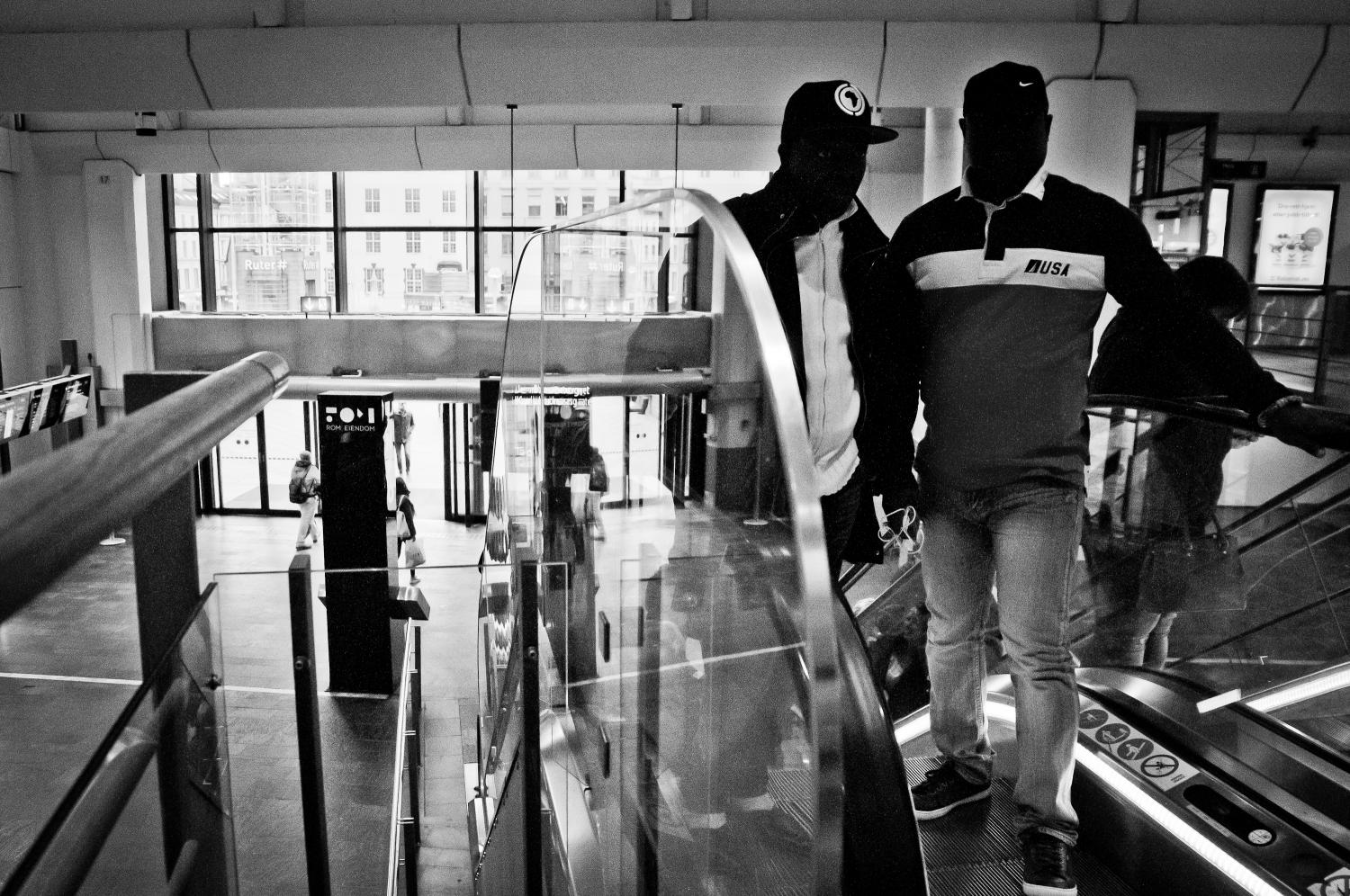
Refugees from central Africa now living in the West, such as these two Burundians living in Europe (2016), often refuse to go on record or be identified in any photographs that might be used against them by the government intelligence agencies of the countries they fled. Refugees from the great lakes countries that have sought and received asylum in Western countries like the United States, UK, Canada, Sweden and Norway face obstacles that are unimaginable to themselves or to the average citizens of their host countries. Having survived unspeakable atrocities and inhuman ordeals, sometimes lasting for over a decade, some of those granted asylum continue to fear a very real persecution on charges of war crimes or, e.g., genocide in Rwanda, which has and can result in deportation and return to their home countries where they face certain persecution.
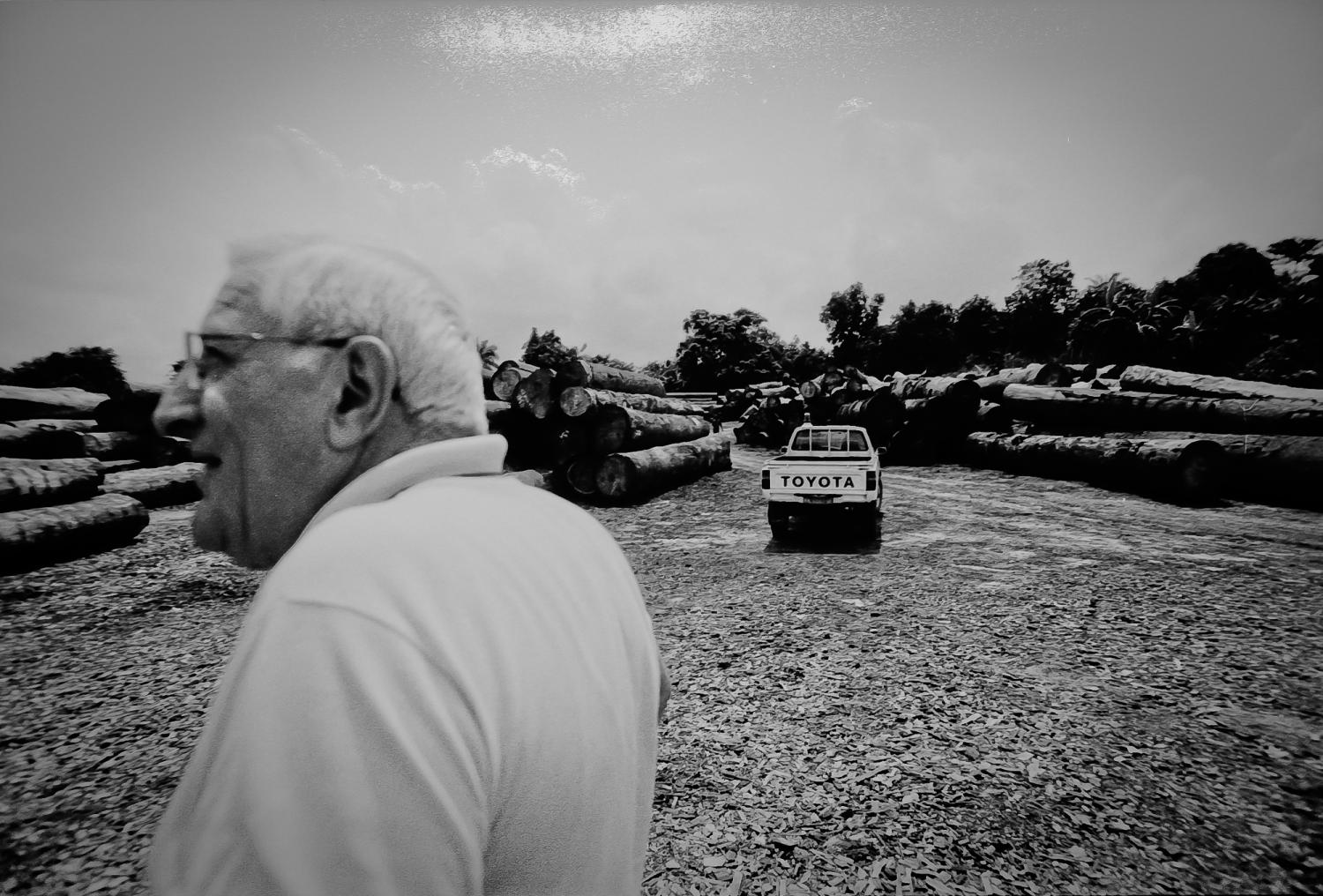
* Belgian businessman Georges Somja complains to Dutch filmmaker Renzo Martens (not seen) about the difficulties of operating during war time in DRC; most big business from the extractive industries support one side or the other, and sometimes worked with all sides to ensure that the extraction of natural resources continued unabated. The complaints are an extreme example of white man's entitlement: the foreign owned extraction industries are exploiting and they do it through violence (which they never take responsibility for, never are held accountable for).
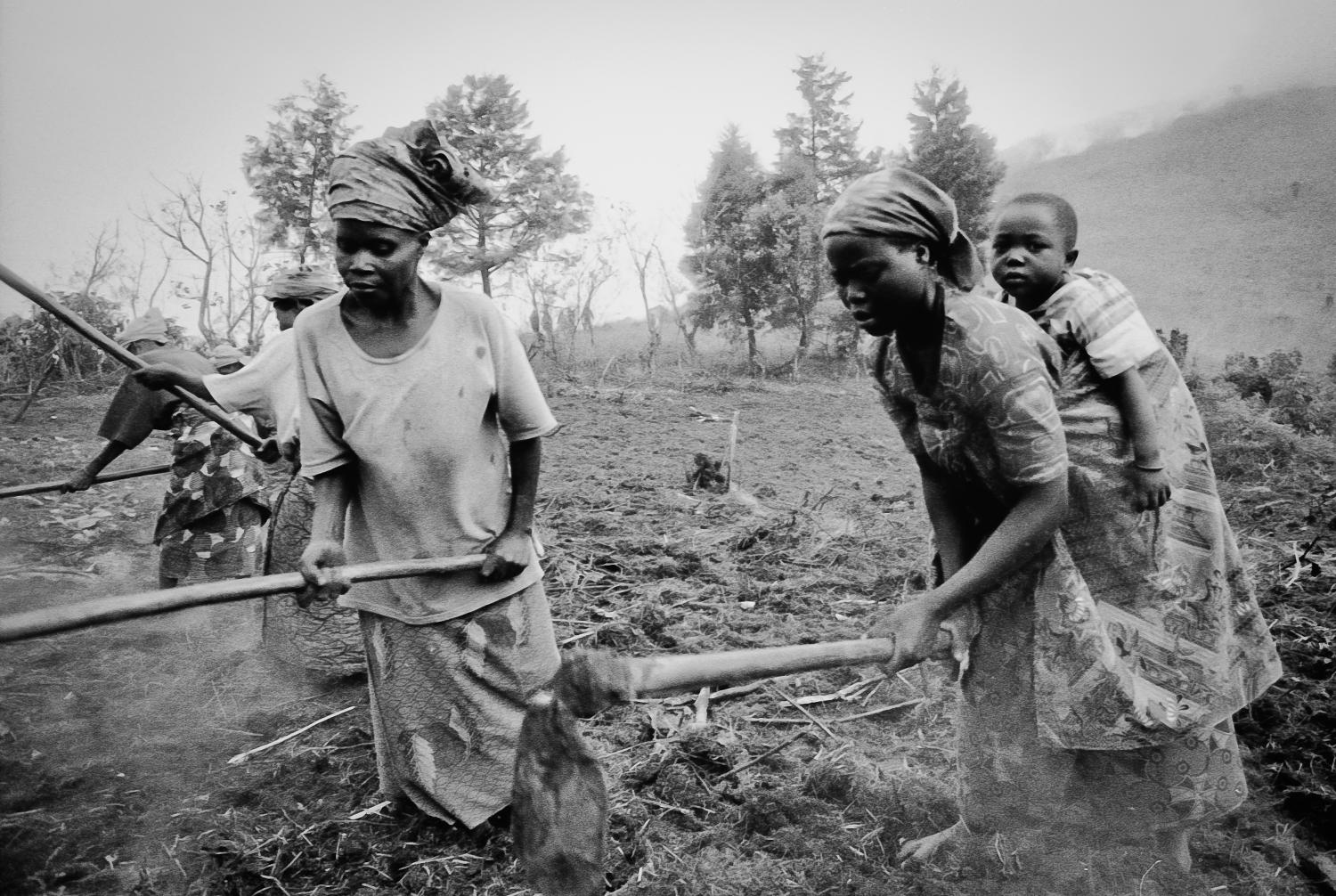
Women in South Kivu work their fields in large groups to attempt to protect themselves from abduction or rape by any of the known and unknown military assailants that have perpetually harassed their communities for the past 20 years. Disruption of the planting cycles is one of the main tactics military factions use to destroy the cohesion and sustainability of villages and communities, and it is the major cause of hunger and starvation. These women work with an audience of soldiers standing back on the ridge, behind the trees (invisible in this photo).
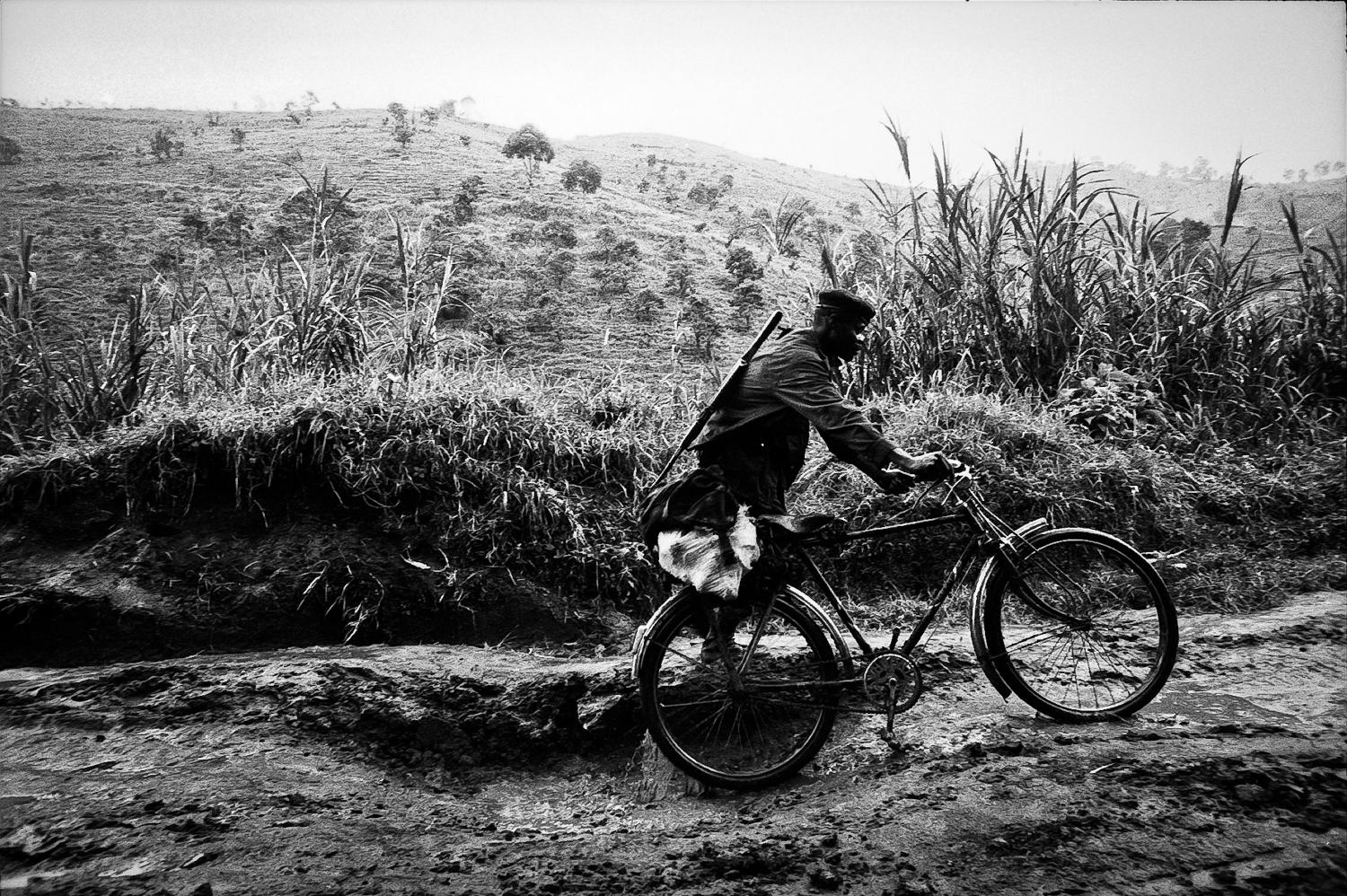
Soldiers in the great lakes region are often existing by the skin of their own teeth, waging their own personal struggles for survival amidst the hierarchy of violence and suffering. This is a climate that is wholly anathema to Westerners, who cannot identify with the human element of the soldiering, unless they have seen war personally.
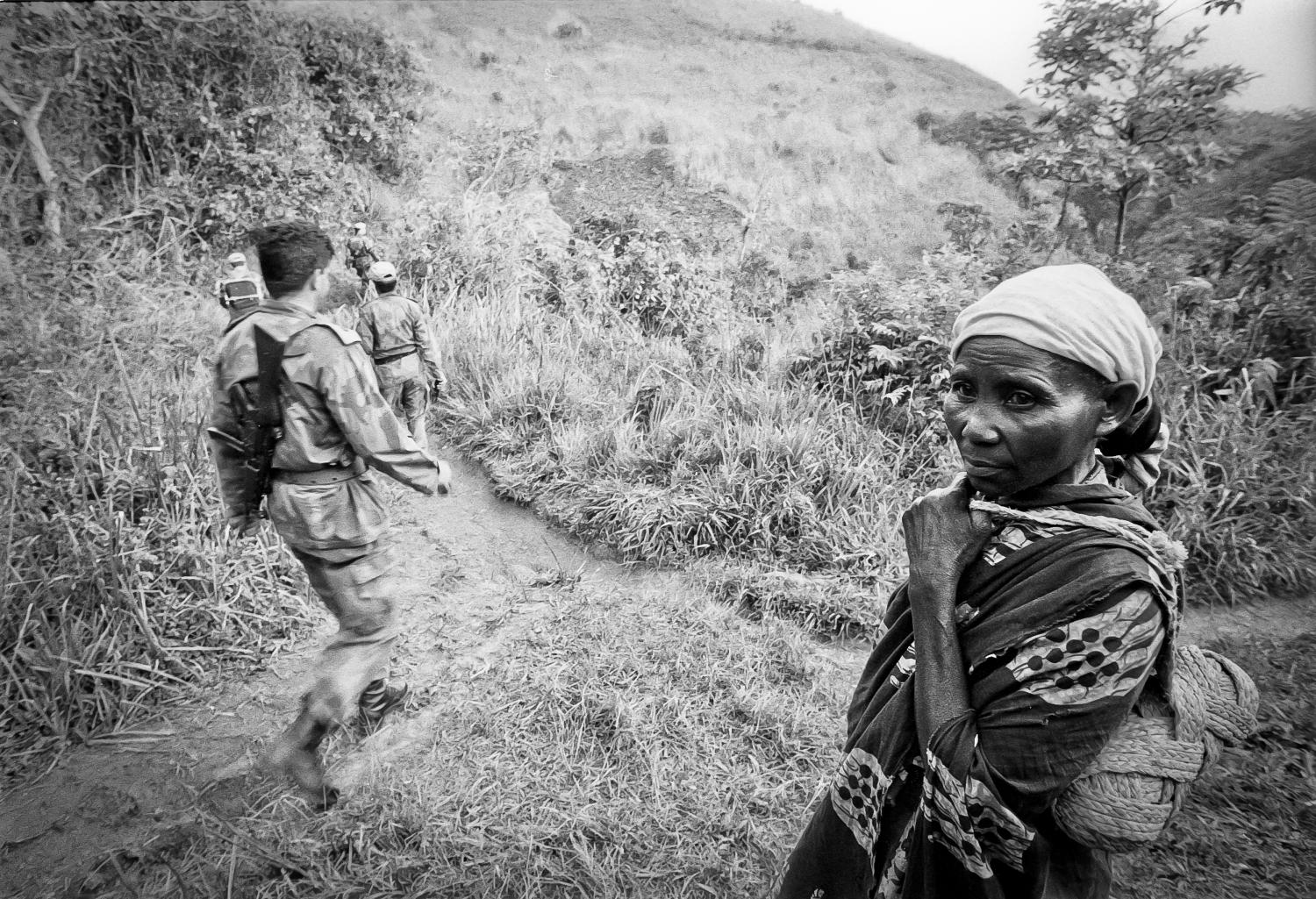
* A local woman watches fearfully as MONUC troops pass by her on the trail between her home and fields. Regardless of the highly trumpeted "Zero Tolerance" policy, UN troops have participated in the prostitution, sexual assaults and rapes of women in Congo.
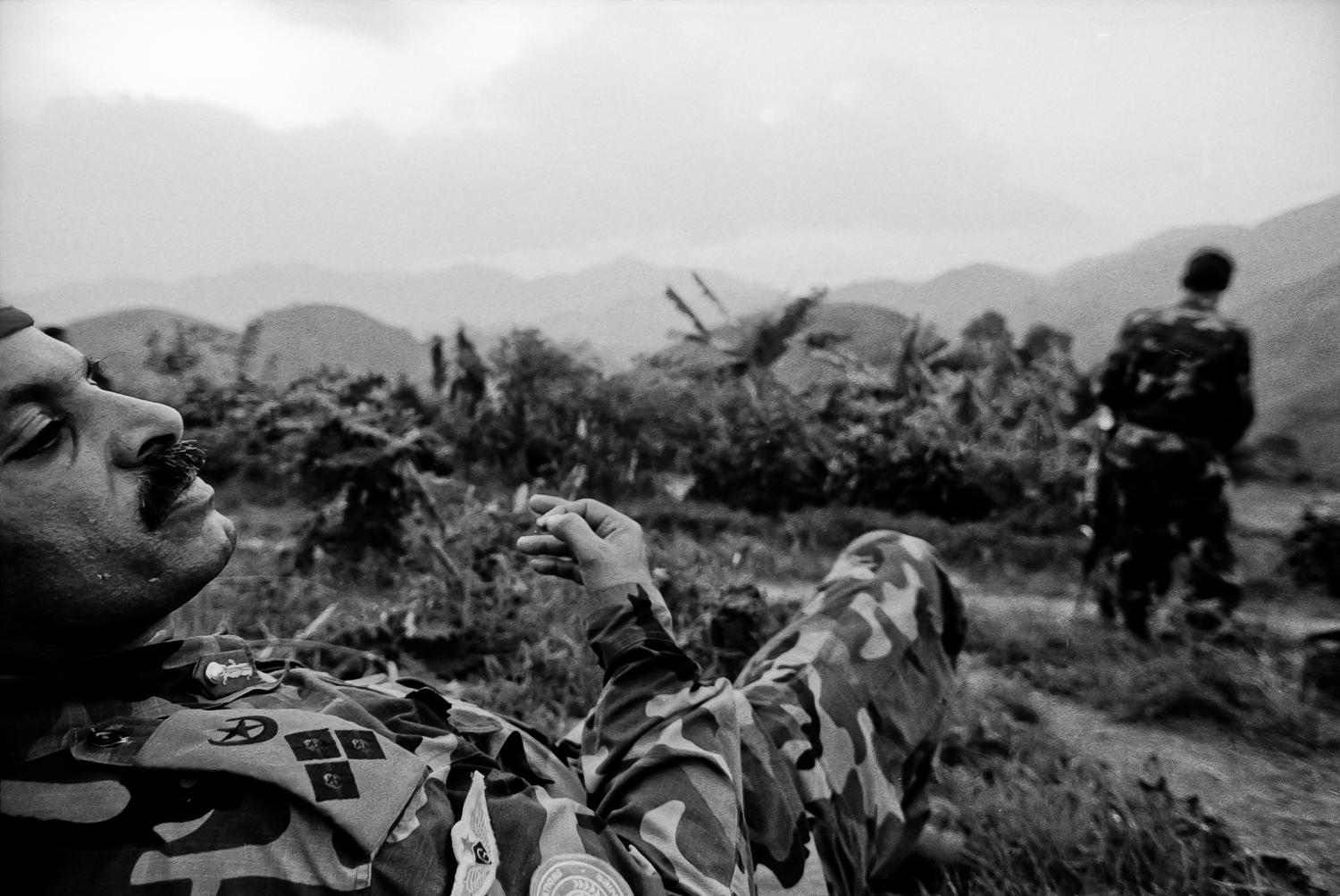
* Pakistani General Shujatt relaxes and smokes during a military operation in Walungu territory, South Kivu.
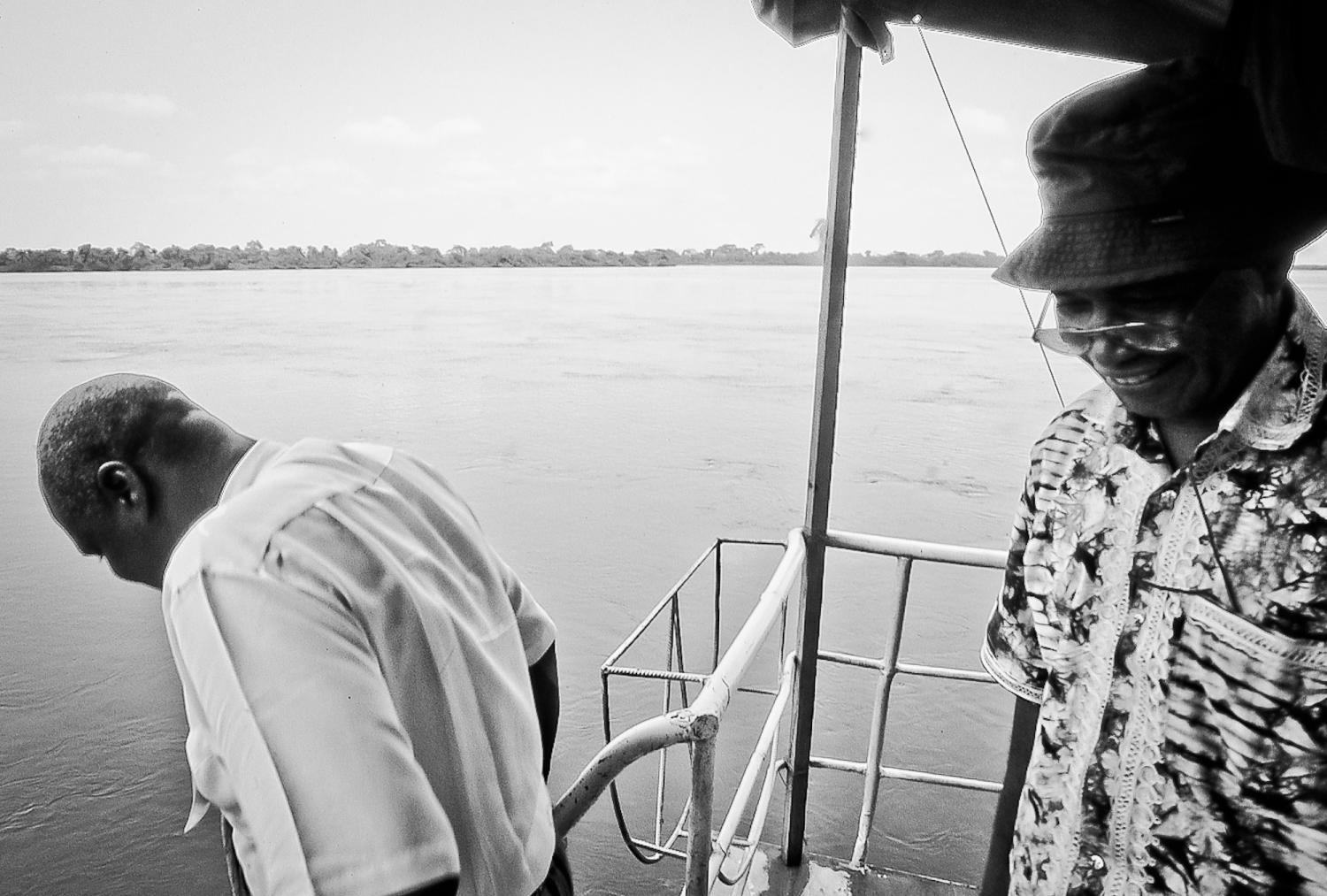
* The governor of Orientale province smiles while leaving the captain's galley with a large envelop full of cash on a tug boat moored on the Congo River at Isangi, DRC. The tug boat will haul barges packed with giant logs, expropriated by the Blattner family enterprises, from Isangi to Kinshasa along the Congo River. The Blattner's run plantations for palm oil, coffee, rubber, cocao and timber, where the working and living conditions are inhumane (see, e.g.: "Inside the Company, Down on the Farm," an SDN exhibit about plantation slavery, by Keith Harmon Snow.)
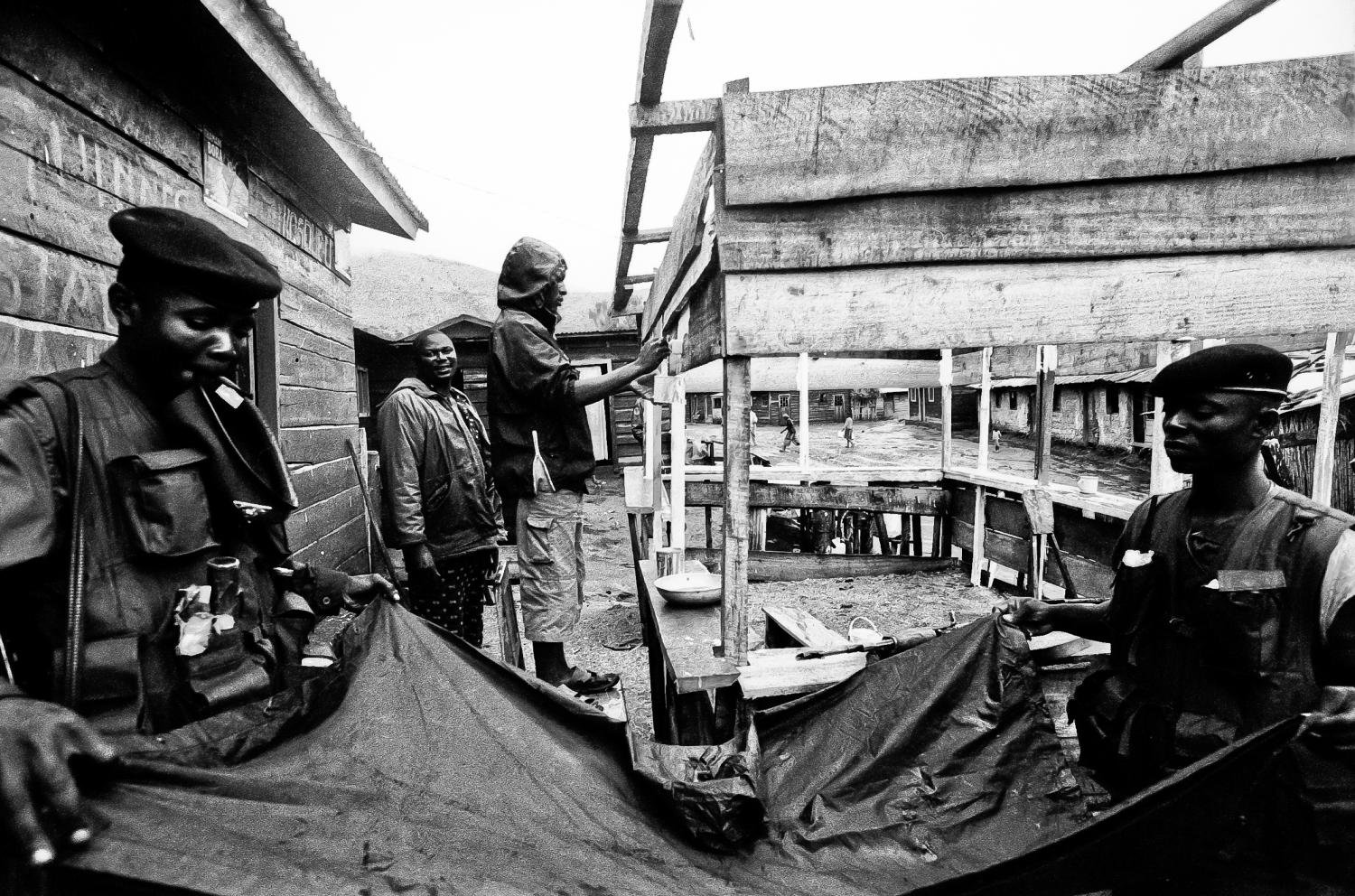
* FARDC soldiers pack their poncho in a rural village of North Kivu -- where locals have been attacked by all sides again and again.
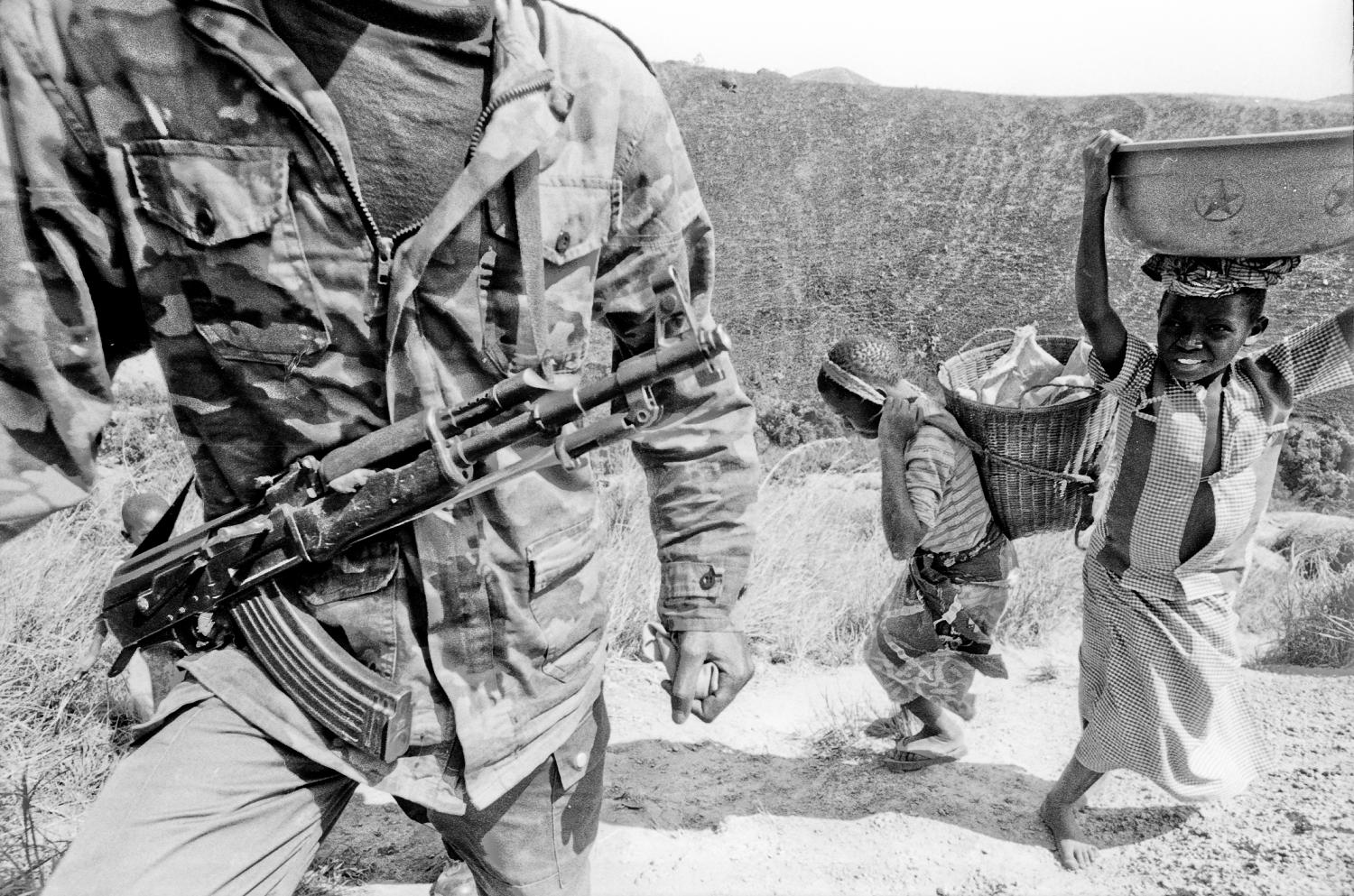
* Rwandan militia oversee mining operations in the Walungu territory of South Kivu while children hoof supplies and ores up and down steep slopes.
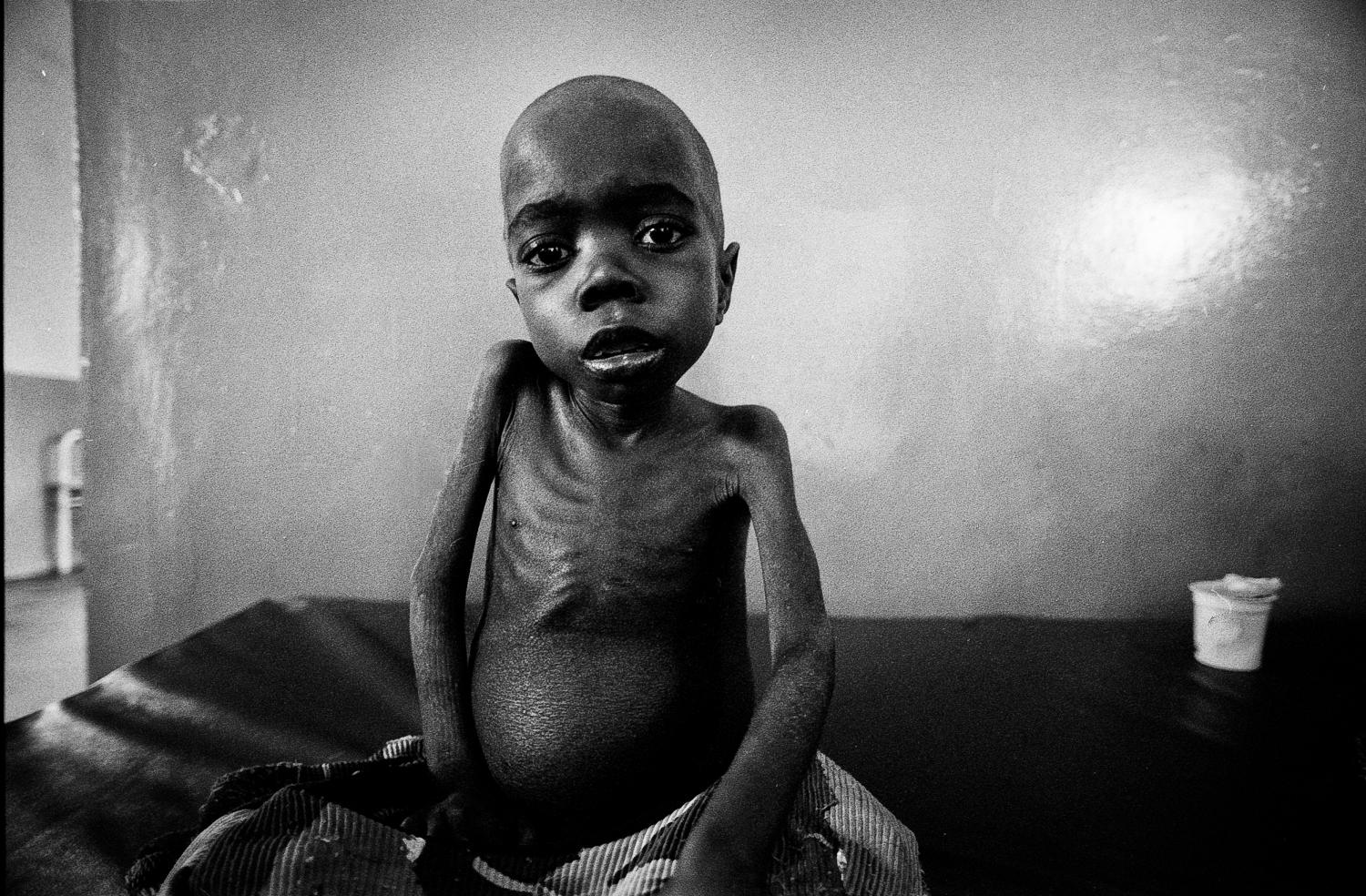
* Starvation speaks for itself. Here is the quintessential photo of "starving African child" -- a cliche'd image grounded in a very sad and unnecessary reality -- of the kind used by the NGOs of the misery industry (CARE, Save the Children, UNHCR, Caritas International, Doctors Without Borders, etc.) to provoke westerners to donate and support their financial proliferation.
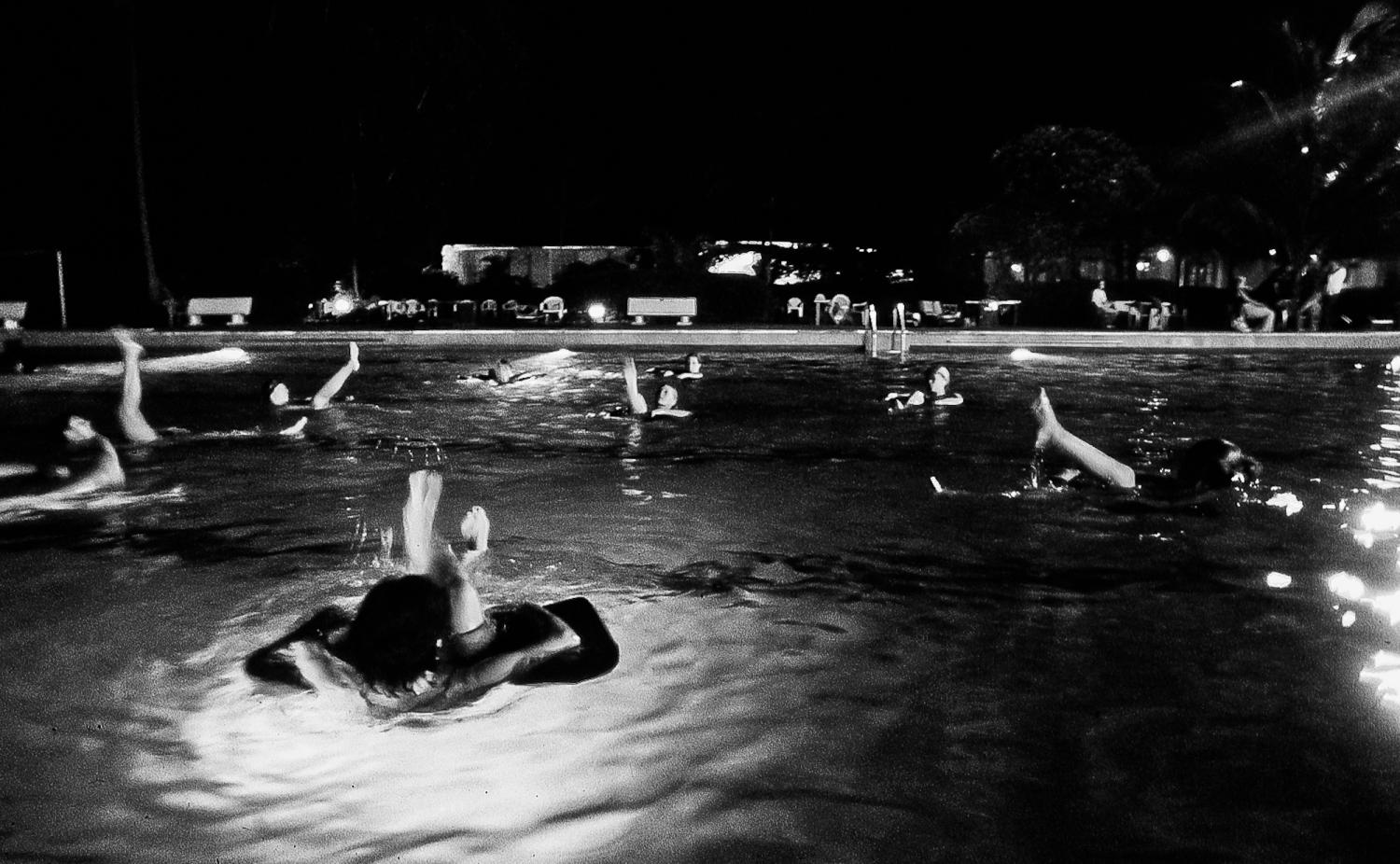
* Well-paid white ex-pat "aid" workers employed from the Western misery industry relax and do aquatic yoga in a swimming pool at a posh private club in Kinshasa, DRC.
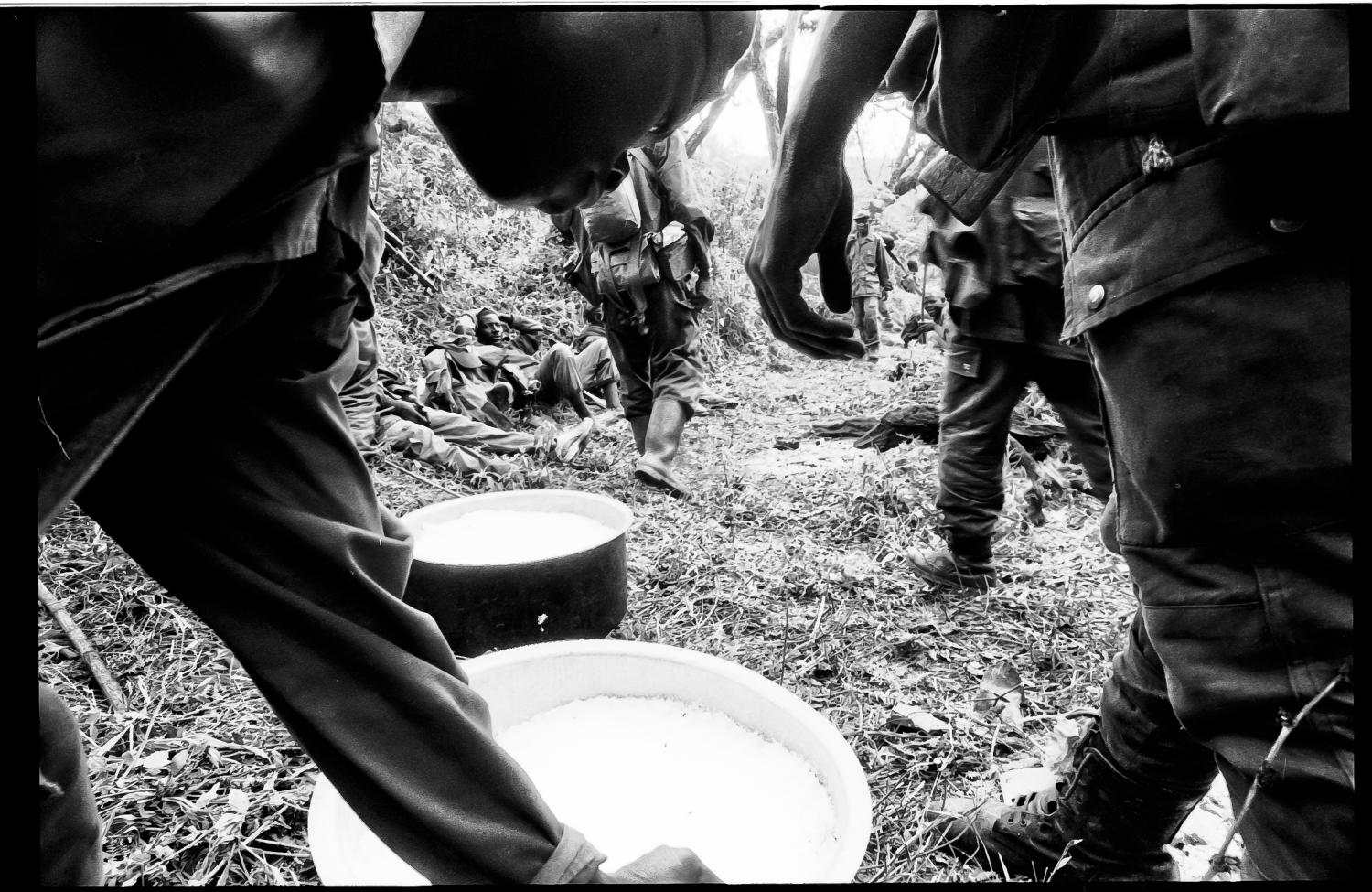
* FARDC troops rest and feed during a long three days operation ("Operation Iron Fist") in South Kivu. The troops carried with them large aluminum basins -- their means to feed large numbers of troops -- that were difficult to pack and carry and in which they cooked cassava and rice.
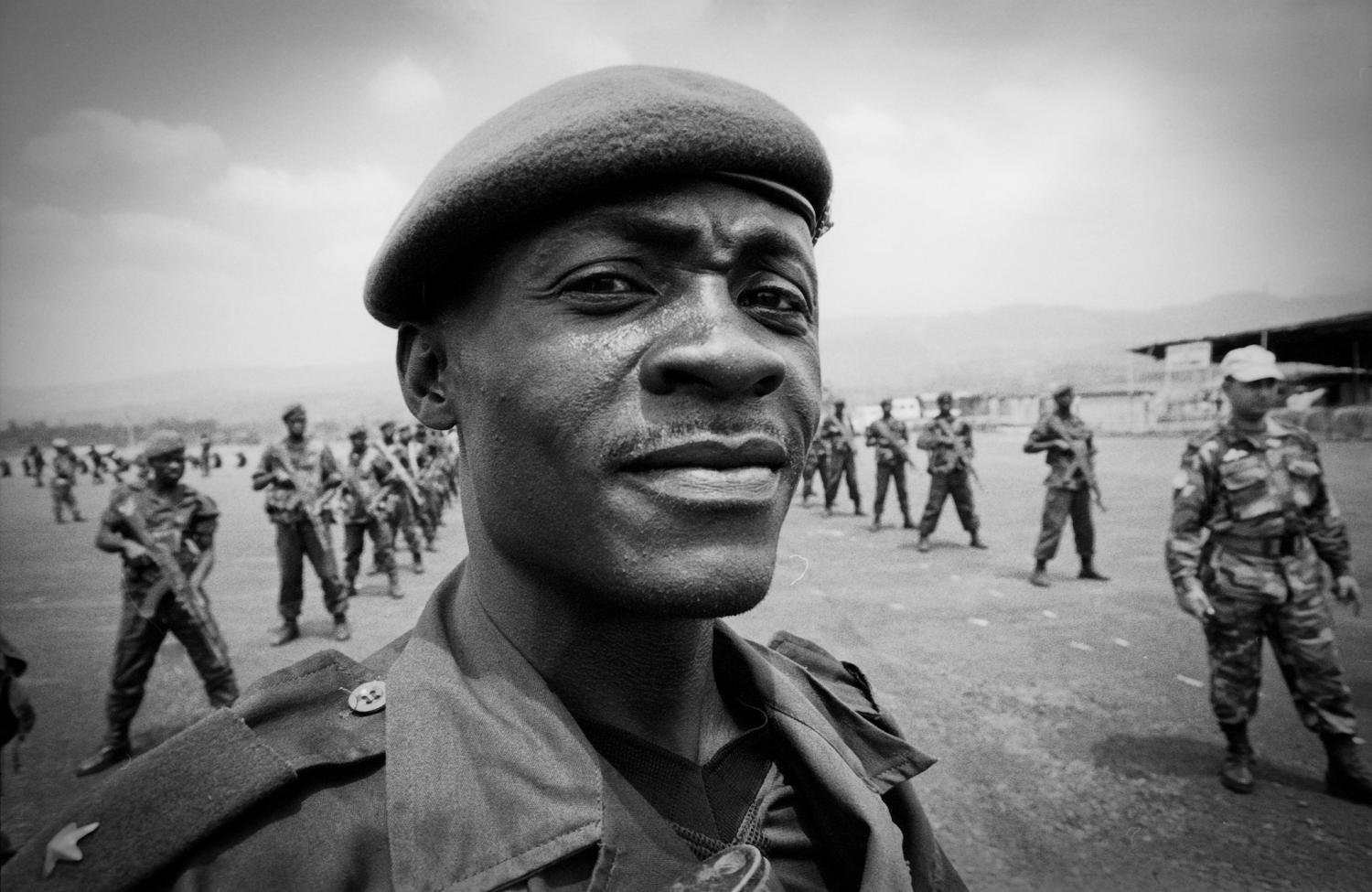
* Captaion Chicko stands at ready in front of FARDC troops (under his command) that are being trained by MONUC commanders.
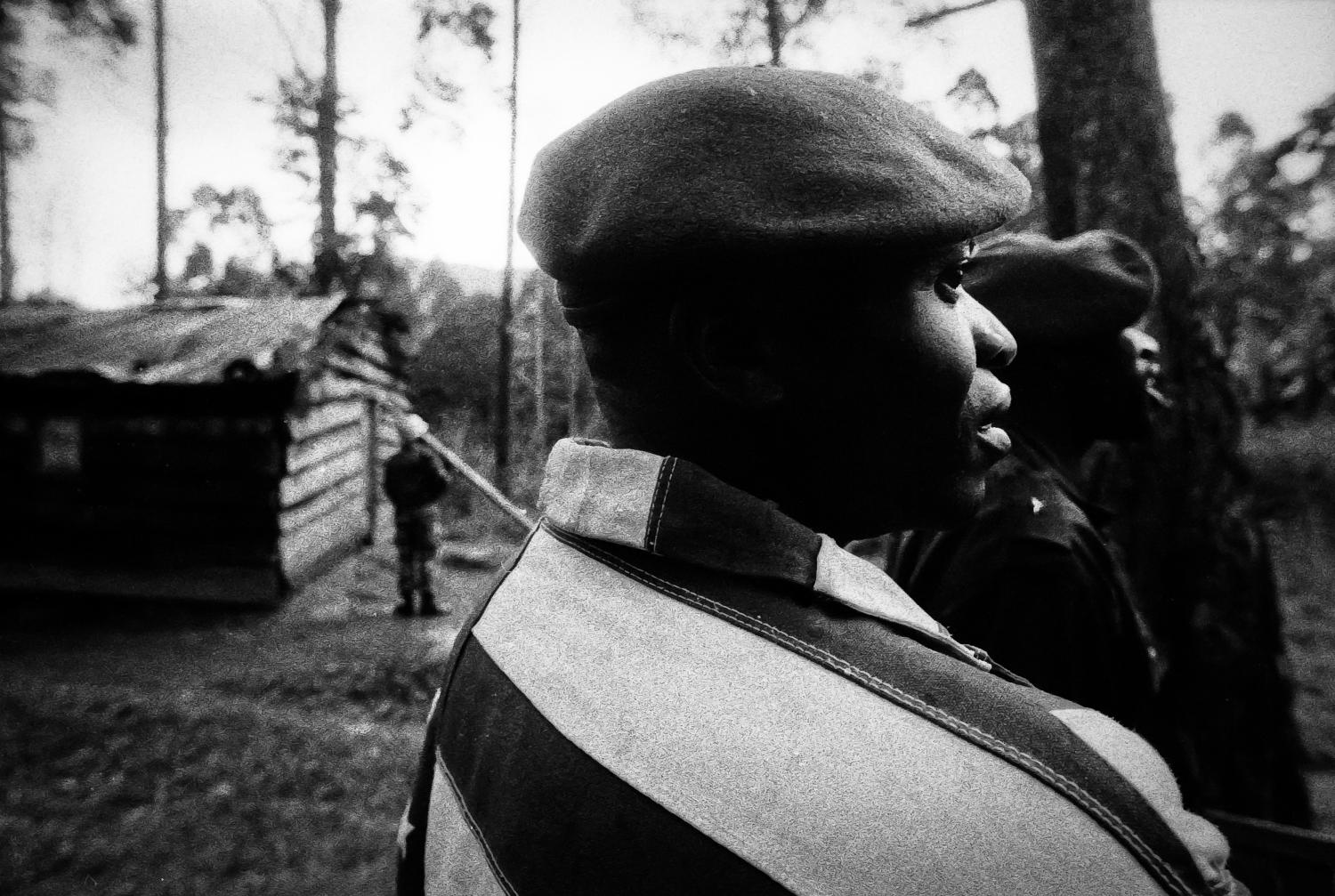
* FARDC soldiers (and one UN soldier, background) look off into the distance where the sounds of gunfire are heard, moving slowly closer. South Kivu, DRC.
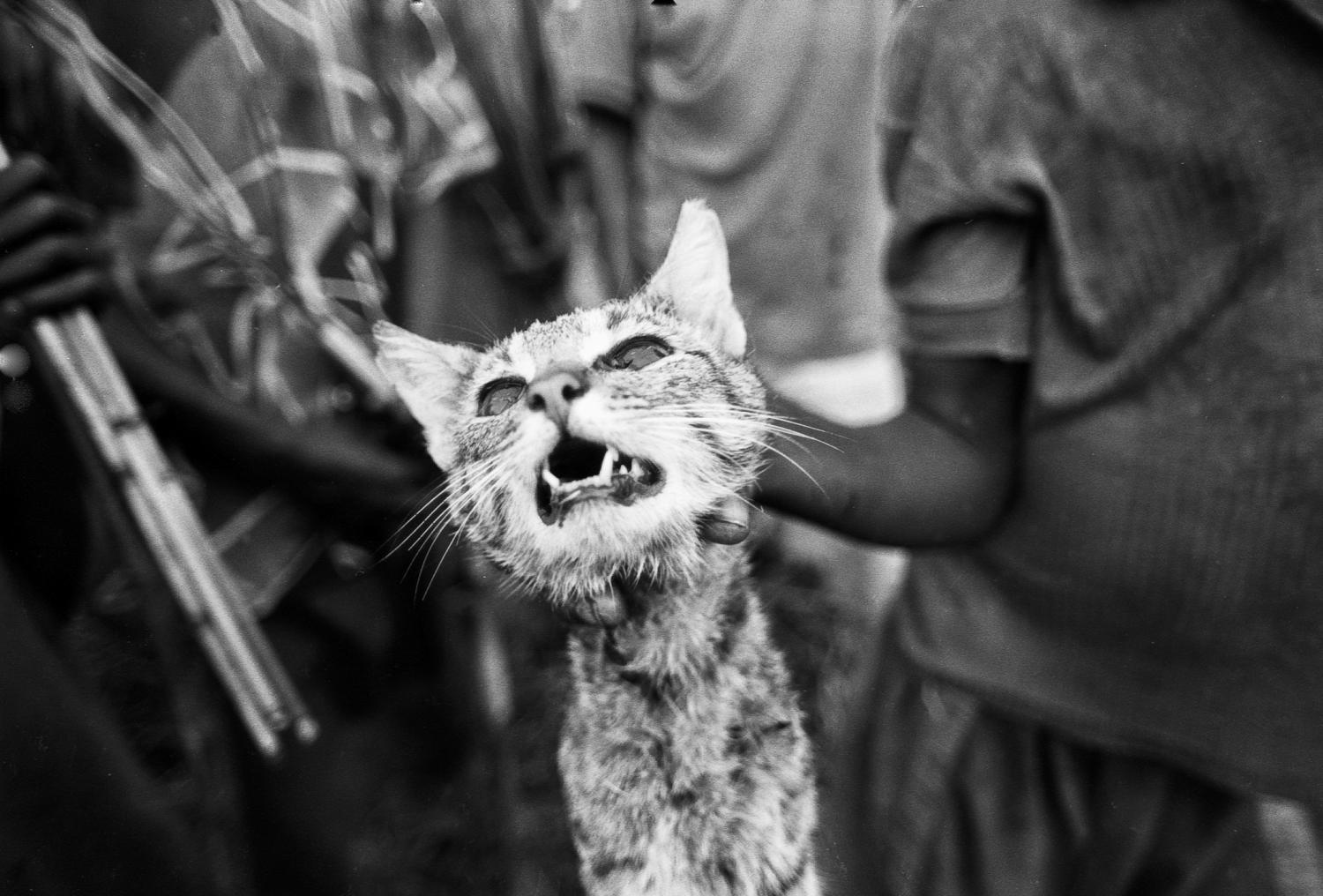
* Hungry boys in the Zani region of Orientale province hunting with bows and arrows will shoot (and eat) anything that moves. "Cats, stray dogs, rats, reptiles u will b surprised what man's starvation and hunger can lead to...," said Benjamin, a Congolese survivor of the holocaust in Congo.
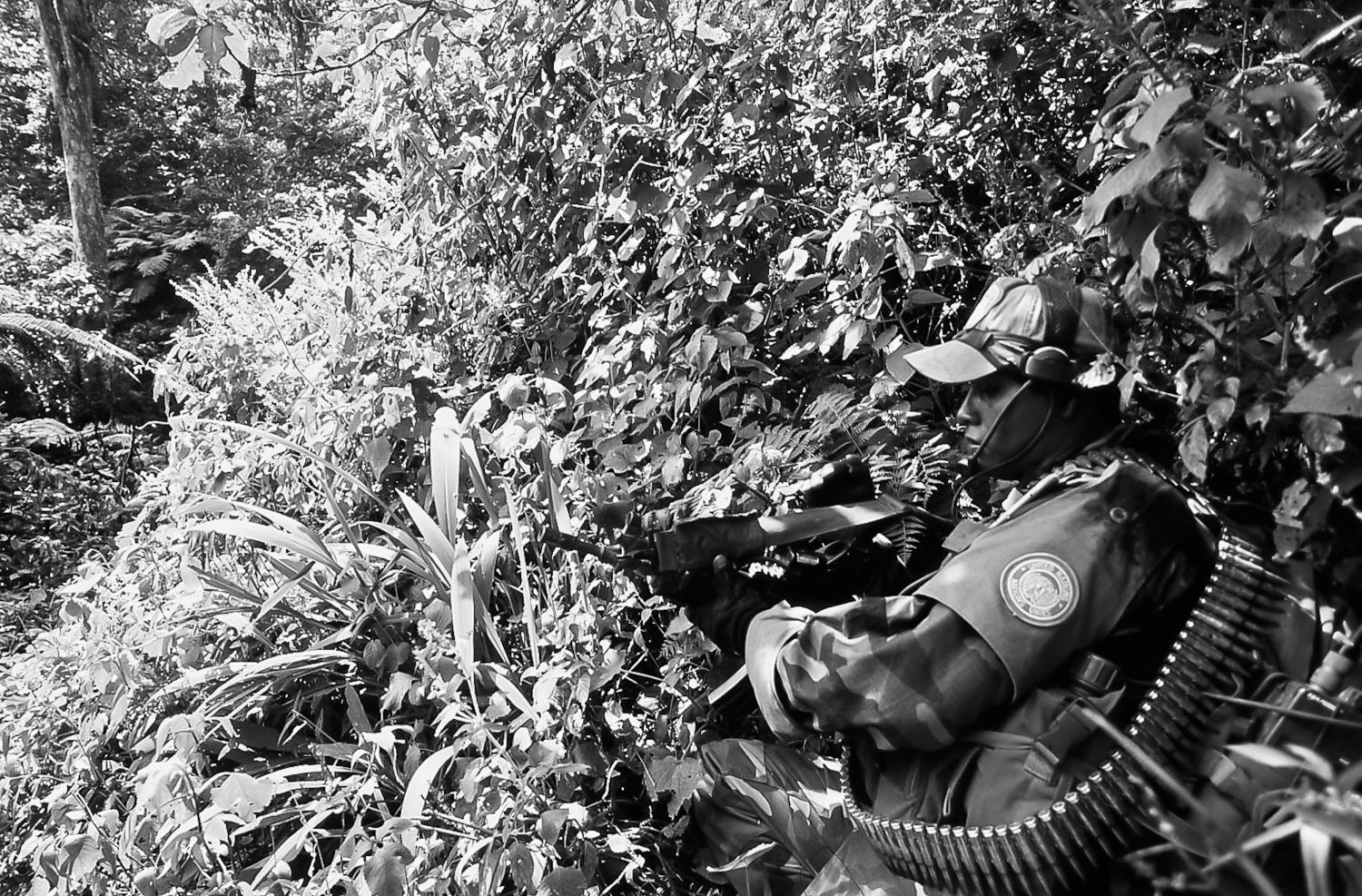
* The MONUC/MONUSCO troops deployed South American Special Forces -- some likely trained at the School of the Americas -- like this heavily armed and outfitted Uraguayan soldier.
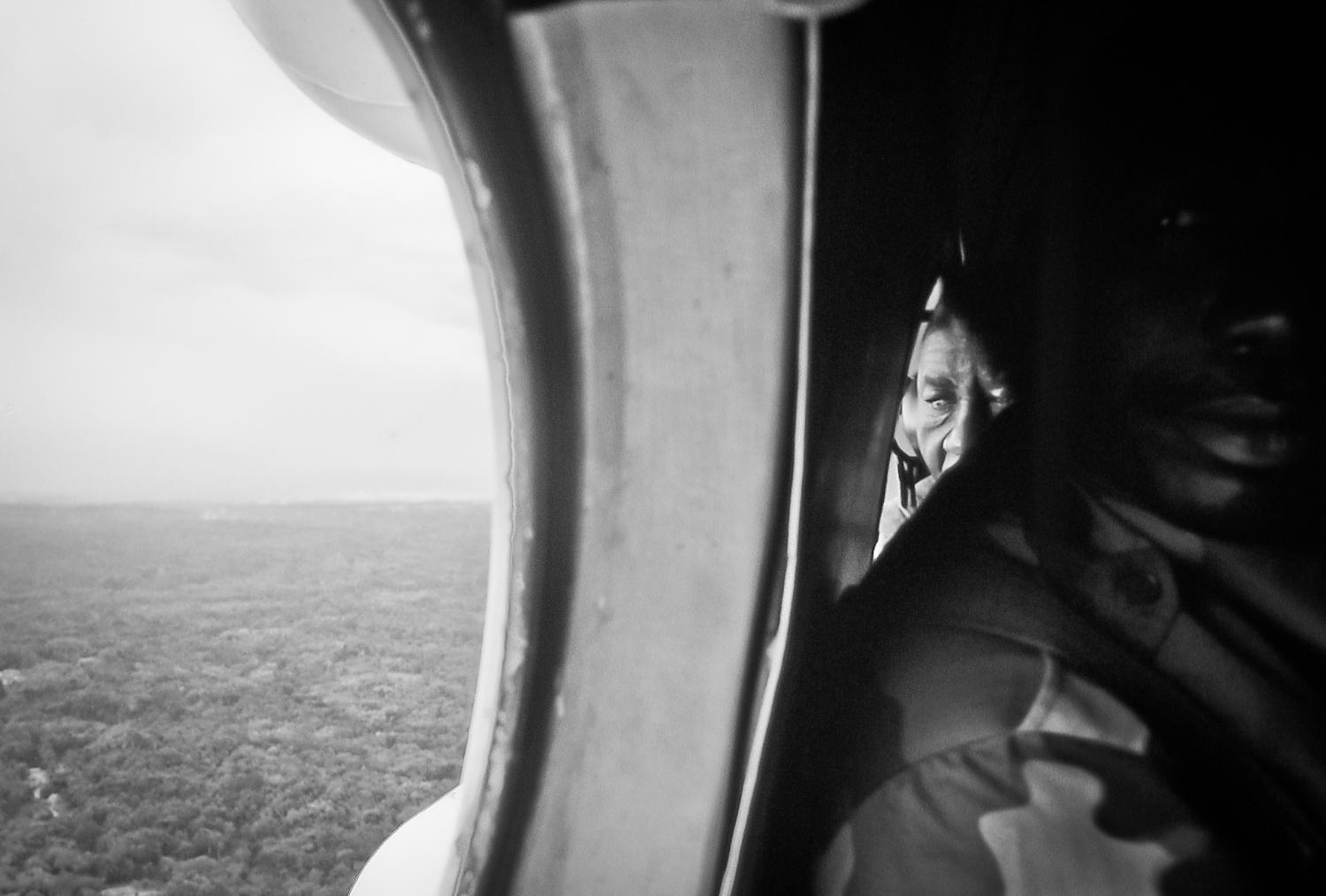
* A frightened local from a village deep in the forest near the gold and coltan mining center of Walikale, North Kivu, DRC, sitting beside (behind) a UN "peacekeeper", is evacuated to Goma on a MONUC/MONUSCO helicopter.
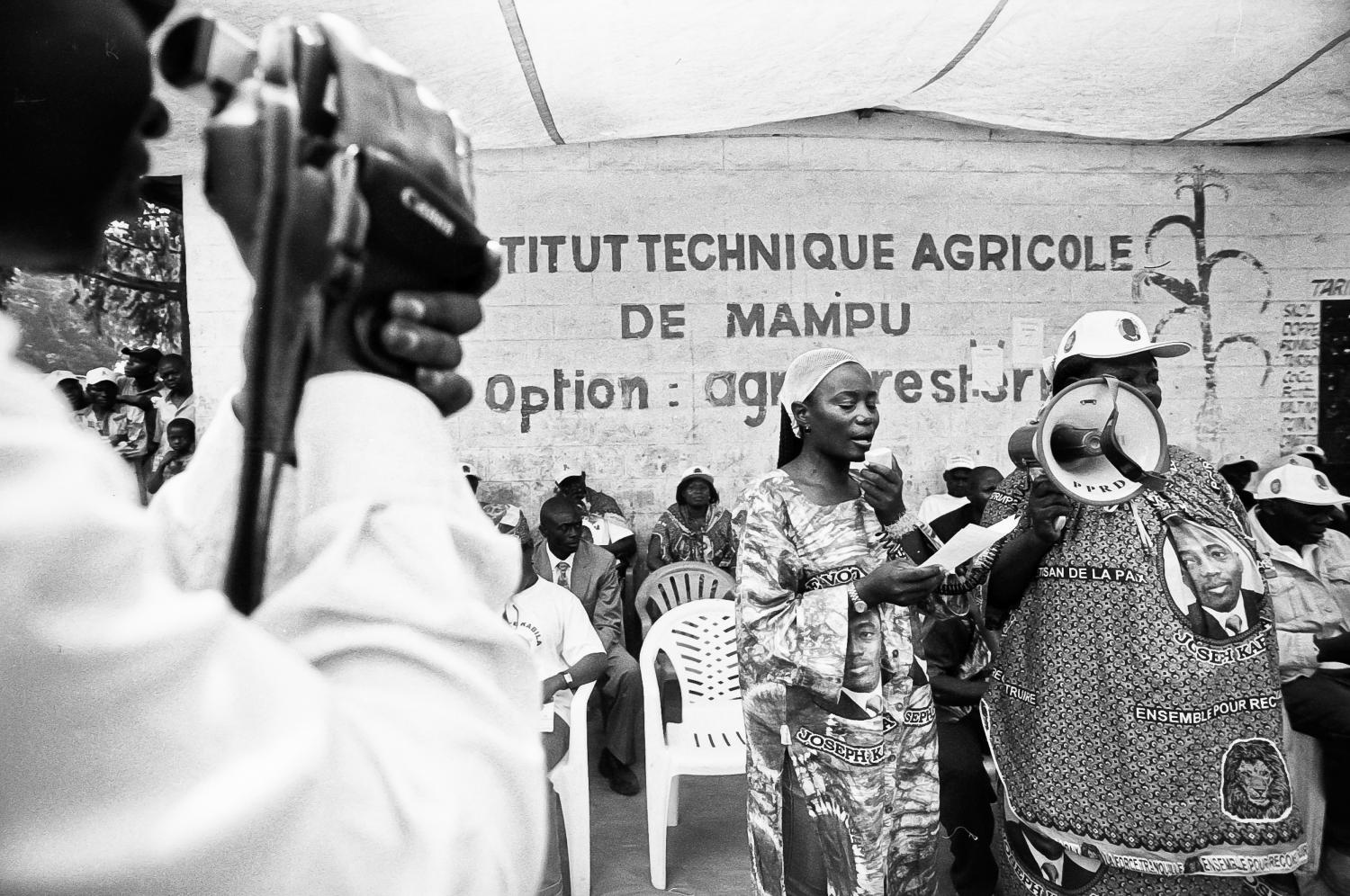
* Janet Kabila (alias) makes campaign promises and bribes people with envelopes of cash, t-shirts, election banners and stickers, etc, to secure votes for her brother, Hippolyte Kanambe (alias Joseph Kabila) in villages a few hours drive from Kinshasa, DRC. As it is with political candidates in the West, the "Kabila's" pre-election promises and bribes were never meant to be fulfilled, but rather only to manipulate voters into voting for Hippolyte Kanambe.